 04/05/2012 17:17 04/05/2012 17:17 |
|
| | | OFFLINE | | Post: 24.773
Post: 7.299 | Registrato il: 28/08/2005
Registrato il: 20/01/2009 | Administratore | Utente Master | |
|


 Caught unaware again by the page change. See preceding page for earlier items posted on 5/4/12.
Caught unaware again by the page change. See preceding page for earlier items posted on 5/4/12.

 A Pope who responds
A Pope who responds
to our nostalgia for the infinite
This may explain the continuing 'boom'
in attendance at the General Audiences
by Marina Corradi
Translated from

May 3, 2012
There had been 20,000 tickets issued, but Wednesday morning at St. Peter's Square, there were at least 40,000 who came to the Pope's general audience.
In addition to the many Poles who had come to Rome for the first anniversary of John Paul II's beatification, were many others - Romans as well as persons visiting Rome perhaps only briefly, or on vacation and had not really planned to go to St, Peter's. Patiently, they all had to fall in line and go through the security checks.
Forty thousand is not a small crowd - it is the population of a city like Imperia or Alghero - to gather on a weekday to listen to Benedict XVI.
The martyrdom of St. Stephen was the subject of the day's catechesis - an event that took place at the very beginnings of Christianity. An old story, or in the journalistic perspective, no story. An event that took place 2,000 years ago? Why would a crowd of 40,000 go through what they had to in order to hear about the first Christian martyr? That's so long ago for us, too remote in time. [Actually, no one knows beforehand what the actual subject of the catechesis will be - so they come not for the specific content of the catechesis, but to listen to what the Pope has to say, about anything - which, being Pope, would always be about confirming them in the faith.]
Why then do so many people come to listen to the Pope on Wednesdays [and at the Sunday and holiday Marian prayers]?
Perhaps it is that in the opaque oppression of a time in which everything seems in decline, on days when we seem condemned to flying low, not to hope for much, and not expect, for us nor for our children, other than limited horizons, this is precisely the time when there is a demand for another kind of word.
When a crisis restricts the hopes of men constrained within narrow spaces, a tacit expectation of another greater hope becomes widespread, often not even acknowledged interiorly.
We might have become habituated to listening every morning to how large the national debt is, the declining gross national product, and growing unemployment. We could have resigned ourselves to be more poor, and to foresee that we could be even poorer in our old age. But it is precisely in such uncertain horizons that hunger grows for a greater hope, one so great that it cannot be reduced to any index nor containable in any diagram.
Why then do people go to listen to the Pope, without really planning to do so, when around them there is the splendor of Rome on a beautiful morning in May? Perhaps, they are there as if for a fresh gust of oxygen after stifling in a closed room - and they find themselves in the open, literally, and can breathe in the pure air deeply.
Because everything may decay and be eroded by crisis, but men, at least those who do not forget who they are, have a radical need for a wide and good horizon
So, if all that awaits us could only be described by the declining trends of an aging population and per capita income, then there is truly reason to be sad.
Yet we need another word - we want to hear that everything we wish to see of hope and wonder in the eyes of our children is not an illusion. And that truly there is eternity, that a love that lasts forever exists. How great is this love? We cannot say it with words,
And it is in this imperceptible silent expectation that on a Wednesday, the crowd at St. Peter's is twice as large as those who had requested tickets. And that many came without planning to do so in order to listen to the gentle but firm and sure voice of Benedict XVI.
Who spoke to them of St. Stephen, first of the martyrs. Stephen, who in his last moments said: "Behold, I see the heavens open" - the open heaven for which a nostalgia is inscribed in our hearts as though only in its spaces could our destiny play itself out freely. And in whose name, but that of Christ, is such a daring hope possible?
So one morning, one goes to listen to the Pope. To hear him say that this daring - rejected, often mocked - is reasonable, to feel that we are bearing witness to a God who is not unknown, who, on the contrary, knows each of us, one by one.
"With the trust and abandon of children who address themselves to a Father who loves them infinitely" was the last statement of Benedict XVI in his catechesis last Wednesday.
And to hear such assuring truths the faithful come to listen to him, many of them from far places. It is for this, and nothing less.
[Modificato da TERESA BENEDETTA 04/05/2012 17:55] |
| |
|
| |
 04/05/2012 19:52 04/05/2012 19:52 |
|
| | | OFFLINE | | Post: 24.774
Post: 7.300 | Registrato il: 28/08/2005
Registrato il: 20/01/2009 | Administratore | Utente Master | |
|
 Friday, May 4, Fourth Week of Easter
Feast of BLESSED MICHAL GIEDROYC (Poland, d 1485)
Friday, May 4, Fourth Week of Easter
Feast of BLESSED MICHAL GIEDROYC (Poland, d 1485)
Augustinian, Hermit
Very little information online (in a language I can read - and Polish is not one of them)
about one of the many sainted figures in Cracow's history: He was born a dwarf and could
only use one foot. He was a skilled metalworker who made liturgical vessels and Church ornaments.
As an Augustinian, he lived the life of a hermit in a cell beside his monastery. John Paul II
referred to him during one of his visits to Cracow, but even a well-illustrated English monograph
online about Cracow's saints and blesseds only tells us of the church where he is venerated
and has no image of the blessed one himself.
Readings for today's Mass:
usccb.org/bible/readings/050412.cfm
AT THE VATICAN TODAY
The Holy Father met today with
- New ambassadors from Ethiopia, Malaysia, Ireland, Fiji and Armenia who presented their credentials. Address in French.
- Ten US bishops from New Mexico and Arizona (Region XIII) on ad-limina visit
- Mons. Luigi Negri, Bishop of San Marino-Montefeltro (Italy)
[Modificato da TERESA BENEDETTA 04/05/2012 20:00] |
| |
 05/05/2012 01:53 05/05/2012 01:53 |
|
| | | OFFLINE | | Post: 24.775
Post: 7.301 | Registrato il: 28/08/2005
Registrato il: 20/01/2009 | Administratore | Utente Master | |
|
 Pope welcomes 5 new envoys:
Pope welcomes 5 new envoys:
'Laws must be concerned with
every person in his wholeness,
not just economic objectives'

May 4, 2012
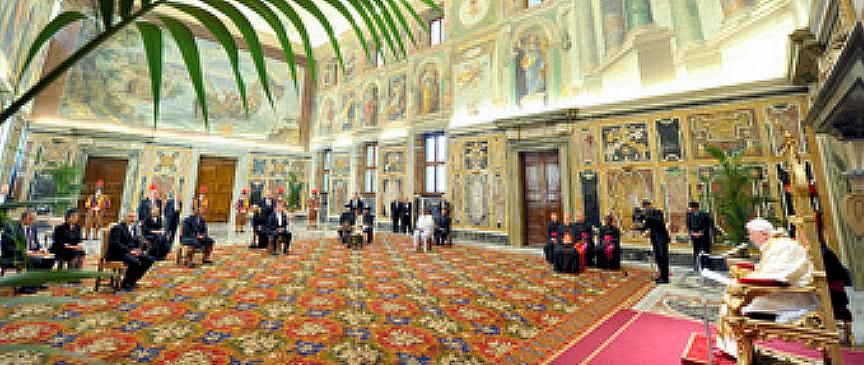
“Allowing everyone the opportunity to know God, and in full freedom, means helping to forge a strong interior personality which enables people to witness to good and accomplish good even if it comes at a cost” said Pope Benedict Friday as he received a group of non-resident Ambassadors to the Holy See from the Federal Democratic Republic of Ethiopia, Malaysia, Ireland, the Republic of Fiji and Armenia. Emer McCarthy has the report:
The Holy Father delivered one general address to the group which focused on how openness to God in society can help overcome the ‘spiritual and material’ poverty that the current economic crisis has produced.
The Pope began by noting how mass communications has made our planet “smaller” and people more aware of the great suffering caused by poverty which is “dramatically developing” and has taken on “new forms”.
Globalisation, Pope Benedict said, has led people to “believe in the possibility of unlimited enjoyment and consumption”, but now that the necessary means to satisfy these needs are lacking, “feelings of frustration have emerged”, resulting in “an increase in loneliness due to exclusion”, a widening gap between rich and poor, and “a perception of unfairness” that can become a source of rebellion.
He called on States to ensure that the social laws do not increase inequalities, adding that in order to strengthen the human foundation of the socio-political reality, “we must be attentive to another kind of poverty: that of the loss of reference to spiritual values, to God”.
This vacuum, he continued. makes discernment between good and evil more difficult and adherence to fashionable ideals easier. Subsequently, “many young people in search of an ideal, turn to artificial paradises which destroy them. Addiction, consumerism and materialism, do not fill the heart of man made for infinity. For the greatest poverty is the lack of love”.
Pope Benedict said: “In distress, compassion and selfless listening are a great comfort. Even without great material resources, it is possible to be happy. Living simply in harmony with what we believe, should remain a possibility”.
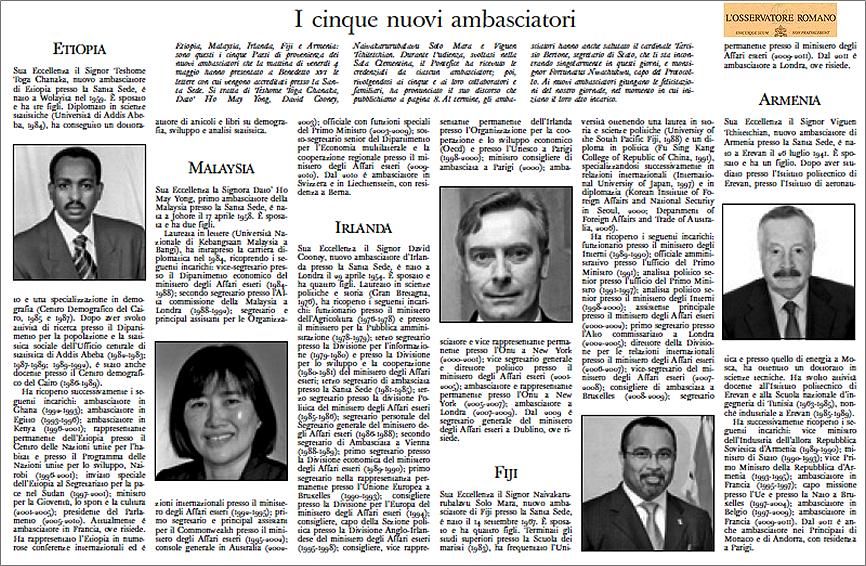
The new envoys are: Teshome Toga Chanaka, Ethiopia; Madame Dato Ho May Yong, Malaysia; David Cooney, Ireland; N.S. Mara. Fiji; and Viguen Tchitetchian, Armenia. (From Page 2 of tomorrow's OR (5/5/12).
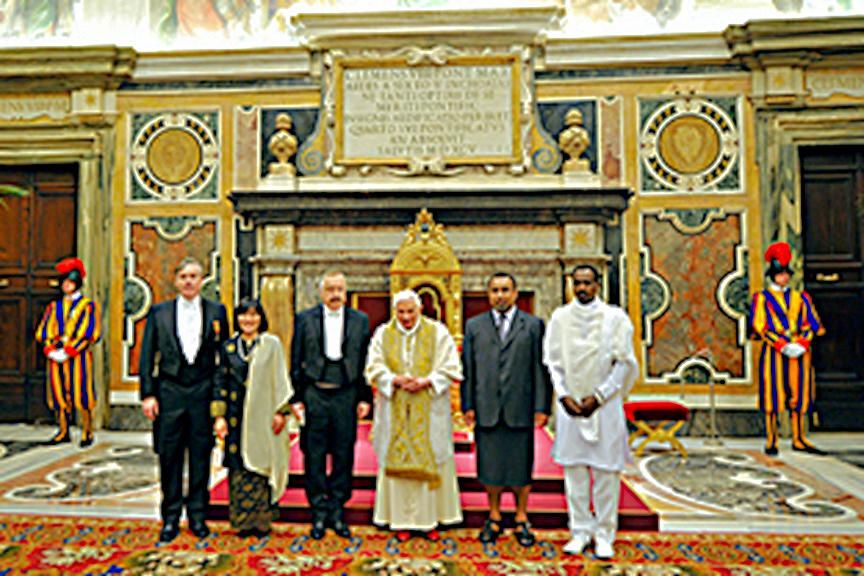 I translated the Holy Father's address, but I lost the entire post when page was reset while I was posting it.I will post when I have re-translated. The English service of Vatican Radio has a translation which is incomplete:
I translated the Holy Father's address, but I lost the entire post when page was reset while I was posting it.I will post when I have re-translated. The English service of Vatican Radio has a translation which is incomplete:
www.radiovaticana.org/en1/Articolo.asp?c=585083
|
| |
 05/05/2012 03:31 05/05/2012 03:31 |
|
| | | OFFLINE | | Post: 24.776
Post: 7.302 | Registrato il: 28/08/2005
Registrato il: 20/01/2009 | Administratore | Utente Master | |
|
|
| |
 05/05/2012 14:28 05/05/2012 14:28 |
|
| | | OFFLINE | | Post: 24.777
Post: 7.303 | Registrato il: 28/08/2005
Registrato il: 20/01/2009 | Administratore | Utente Master | |
|
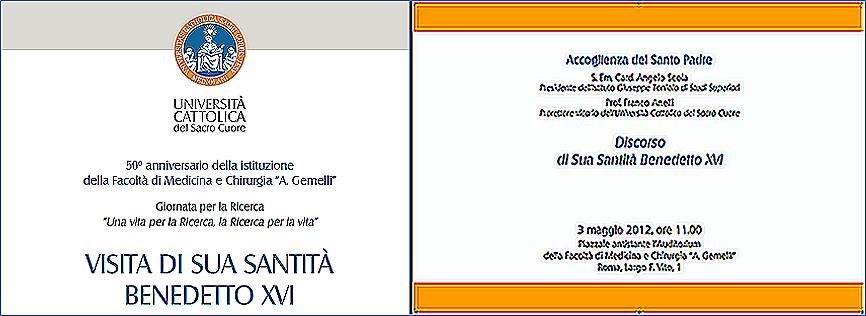 The theme of the event called DAY FOR RESEARCH was 'A life for research, research for life'.
PHOTO RECAP
The theme of the event called DAY FOR RESEARCH was 'A life for research, research for life'.
PHOTO RECAP
Benedict XVI at Rome's Sacro Cuore
50th anniversary of medicine faculty
May 3, 2012
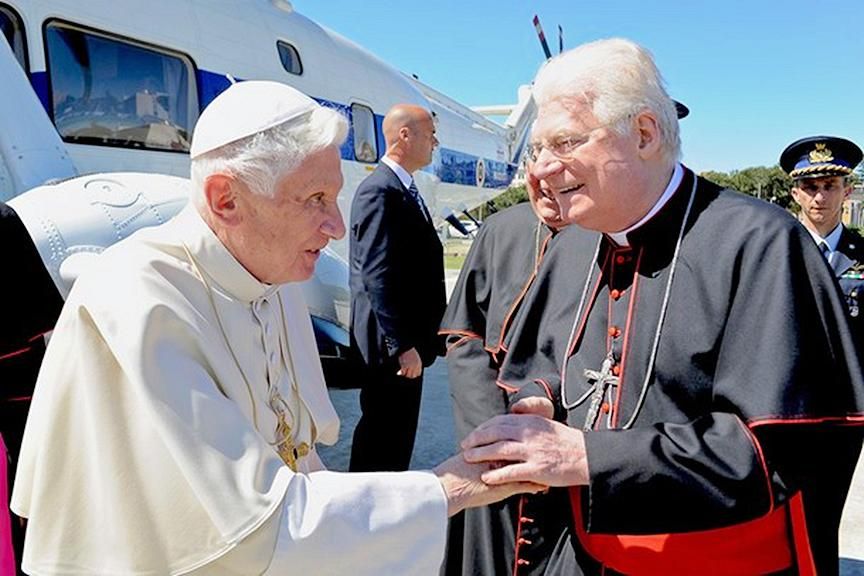 The Holy Father was welcomed to the Rome campus of Sacro Cuore by Cardinal Angelo Scola, Archbishop of Milan (original and main campus of the university) and chairman of the Toniolo Isntitute which runs the Sacro Cuore and its affiliated institutions.
The Holy Father was welcomed to the Rome campus of Sacro Cuore by Cardinal Angelo Scola, Archbishop of Milan (original and main campus of the university) and chairman of the Toniolo Isntitute which runs the Sacro Cuore and its affiliated institutions.
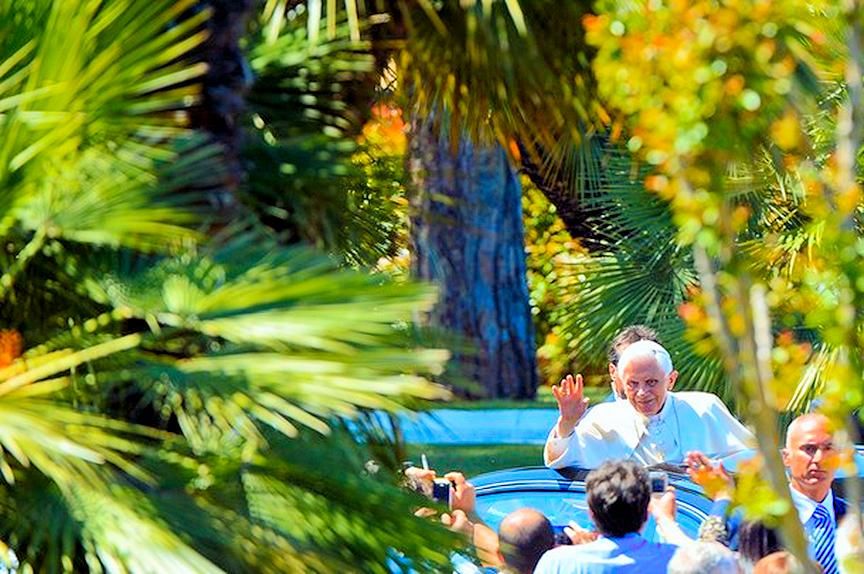
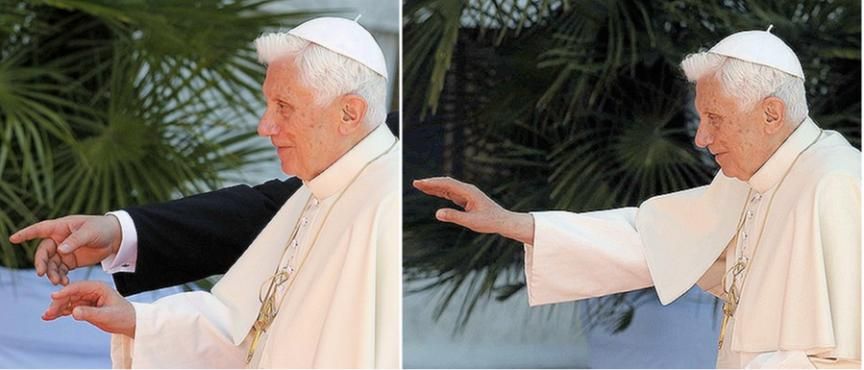
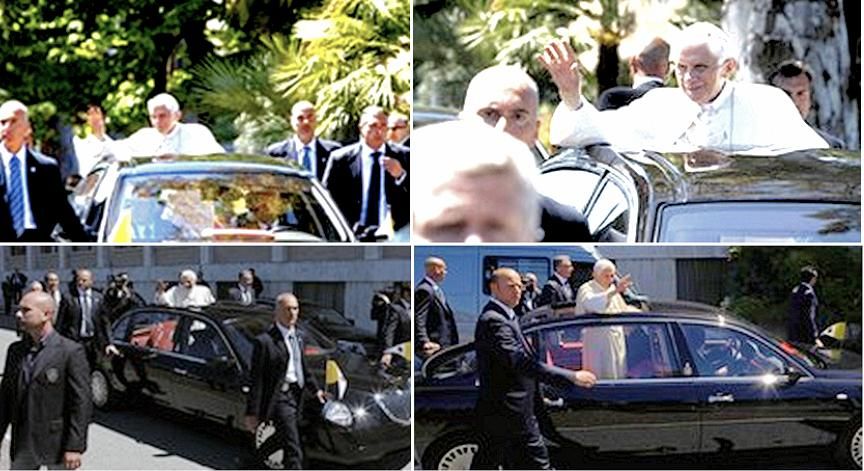
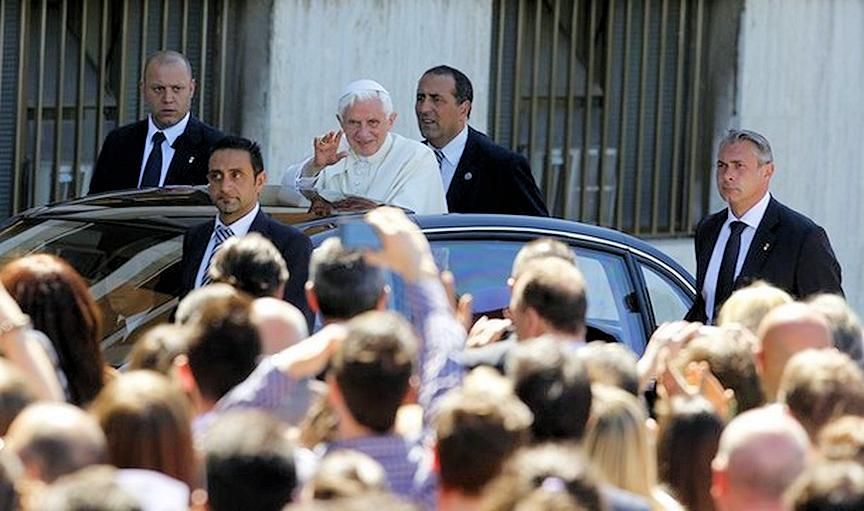
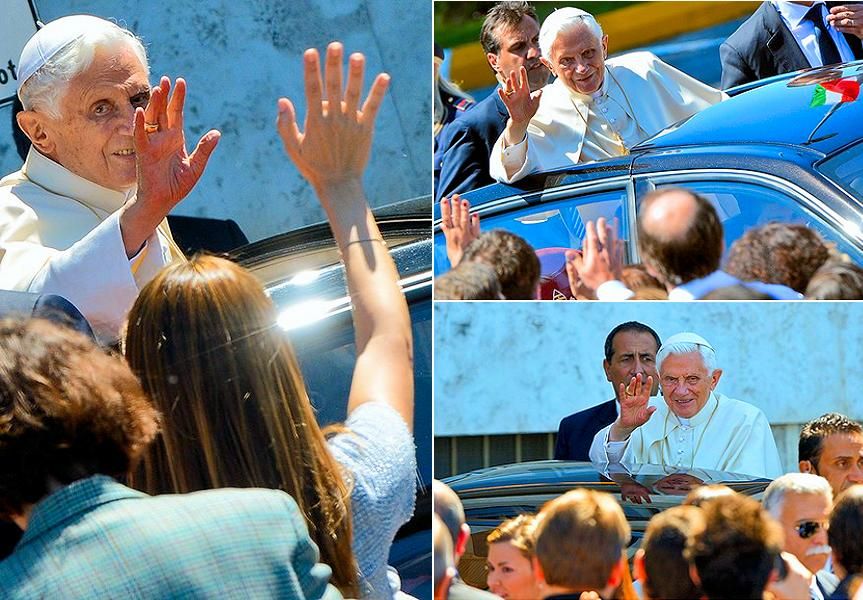
 Among the Italian authorites present were, from left, Gianfanco Fini, president of the Italian Chamber of Deputies; Renata Polverini, president of Lazio region, where Rome is located; and Gianni Alemanno, mayor of Rome.
Among the Italian authorites present were, from left, Gianfanco Fini, president of the Italian Chamber of Deputies; Renata Polverini, president of Lazio region, where Rome is located; and Gianni Alemanno, mayor of Rome.
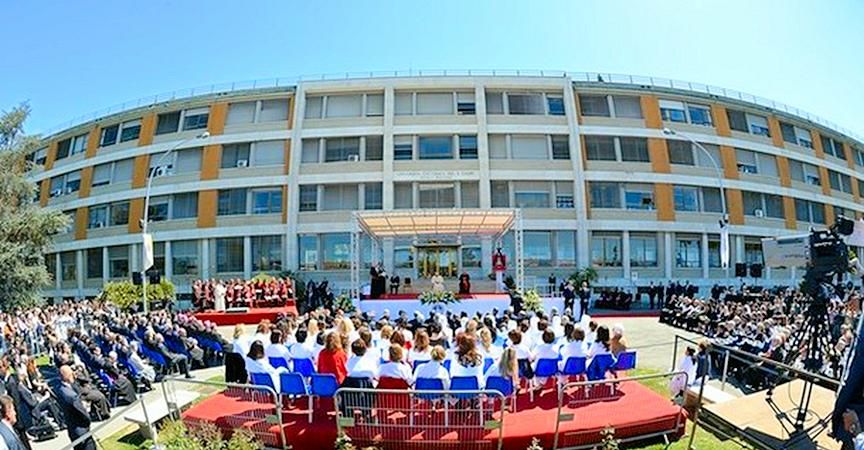
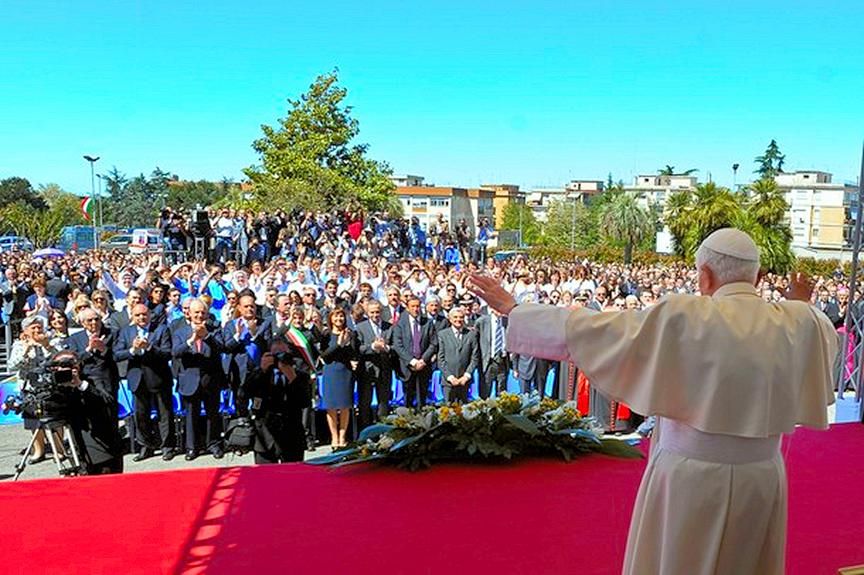
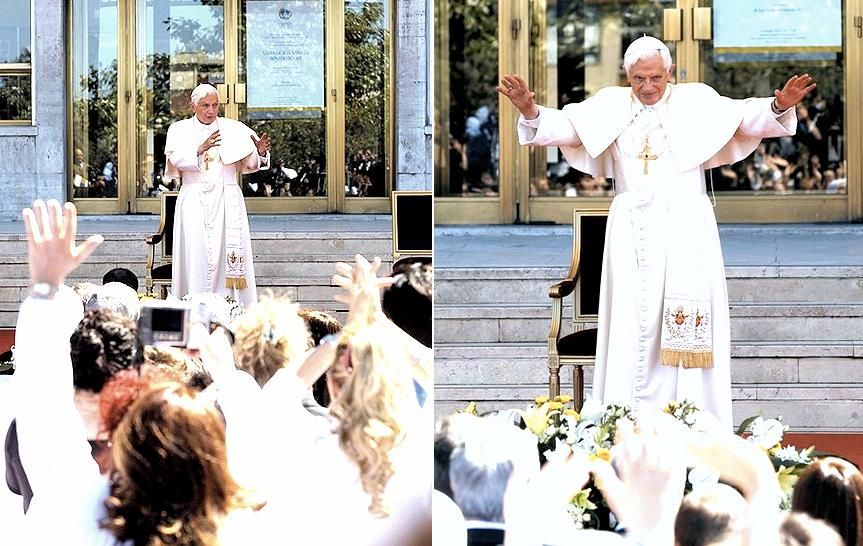
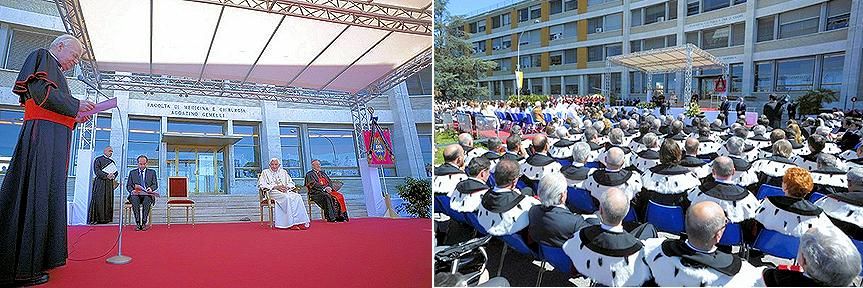
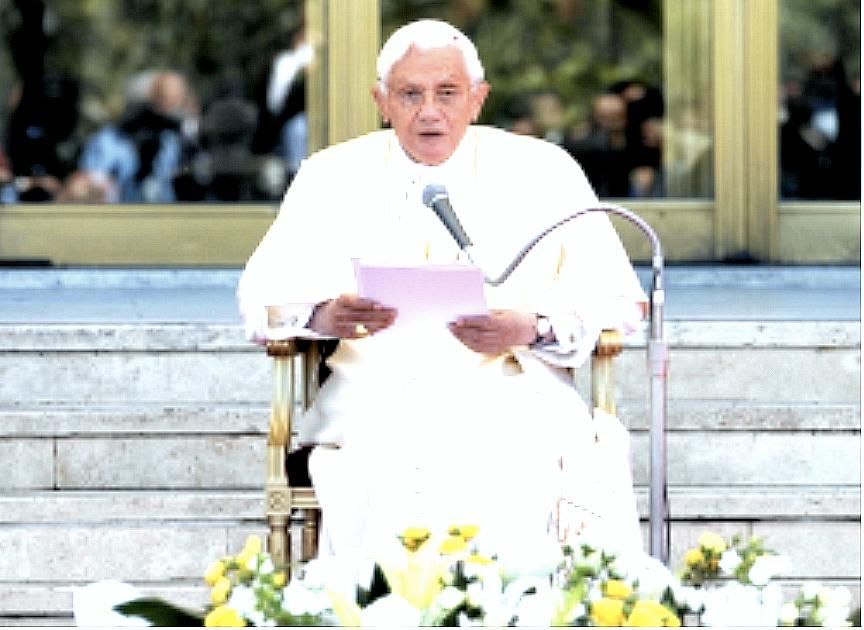
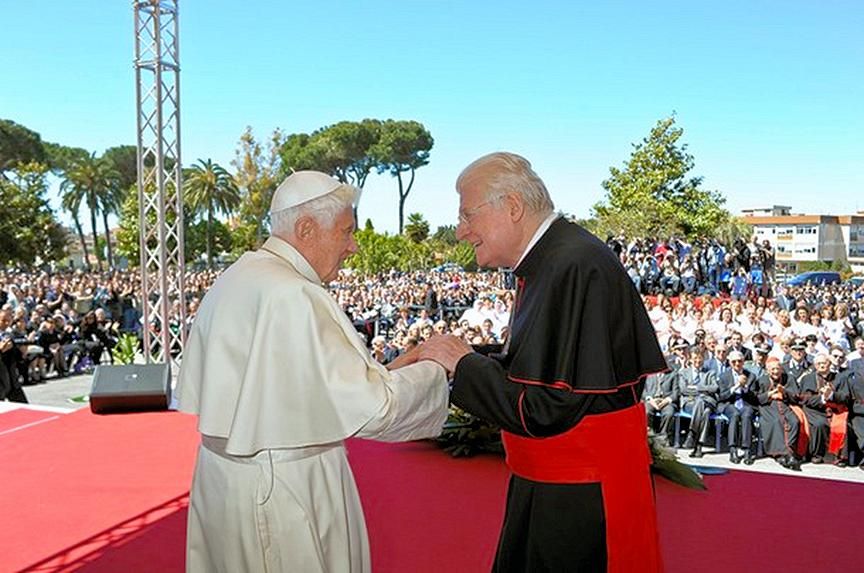
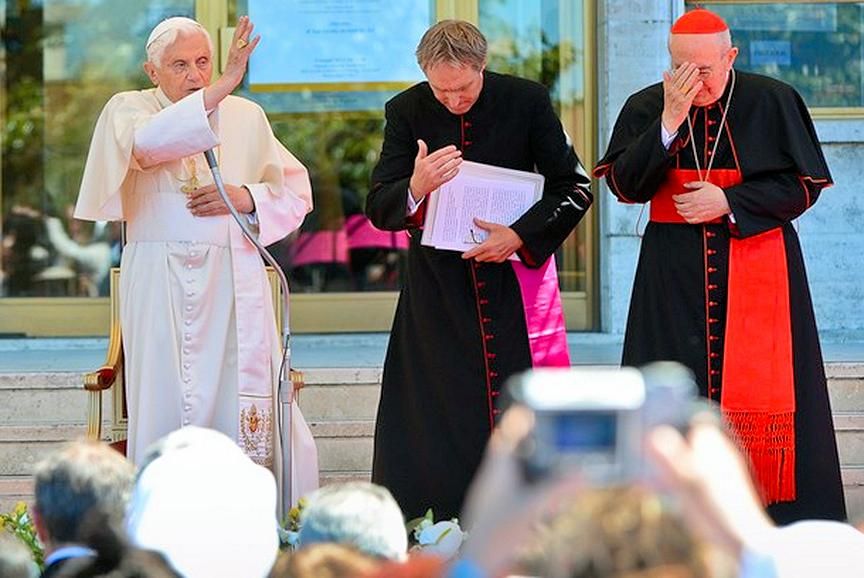
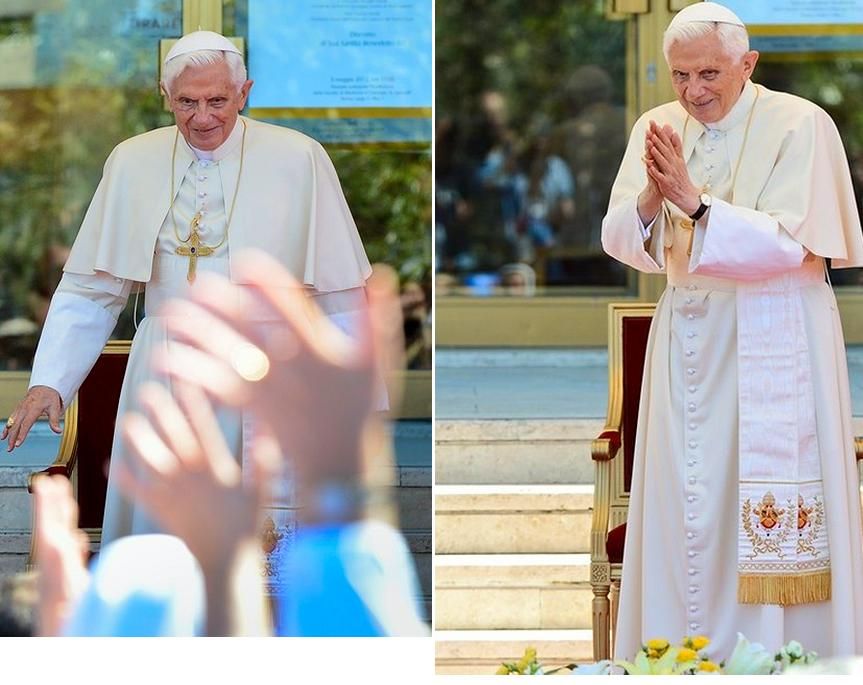 Intelligence, faith and love
Intelligence, faith and love

May 5, 2012
”Without love, science loses its nobility. Only love guarantees the humanity of scientific research.”
In this way, Pope Benedict XVI concluded his speech Thursday morning at the Faculty of Medicine at the Catholic University of the Sacred Heart in Rome. It was a profound and poignant response to a widely felt need for solid and inspiring guidance.
”With a wealth of technical means at his disposal - and almost dazzled by their effectiveness - though rather wanting in real direction toward authentic good, humanity today risks losing sight of the fundamental horizon of the question of meaning.”
Once again, the Pope speaks of confidence in intelligence, of trust in reason; he speaks of Christianity as a “religion of the Logos,” which does not relegate faith to the realm of the irrational, but rather sees the origin and meaning of reality in the whole “creative reason”.
The union of reason and faith is a guarantee of the fertility of each, while their separation leads to a “an impoverishment of ethics,” that makes it impossible to assess whether what is technically possible is morally good – whether it leads to authentic human good.
The Pope said even more, however, for science and medical research are so directly related to the care of the human person, that in them it becomes particularly evident how truly necessary is the guidance of love, how truly essential is the link between commitment to the advancement of human knowledge and passionate dedication to the good of man – a creature who suffers and is confronted with the most radical questions about the meaning of life.
“The dedication of the intelligence and of the heart,” therefore, “becomes a sign of God's mercy and His victory over death.”
What stronger, more thrilling inspiration is there for every effort of the mind in favor of humanity? At the end of the day: toward what else ought human intelligence dedicate itself?
[Modificato da TERESA BENEDETTA 05/05/2012 15:17] |
| |
 05/05/2012 16:05 05/05/2012 16:05 |
|
| | | OFFLINE | | Post: 24.778
Post: 7.304 | Registrato il: 28/08/2005
Registrato il: 20/01/2009 | Administratore | Utente Master | |
|
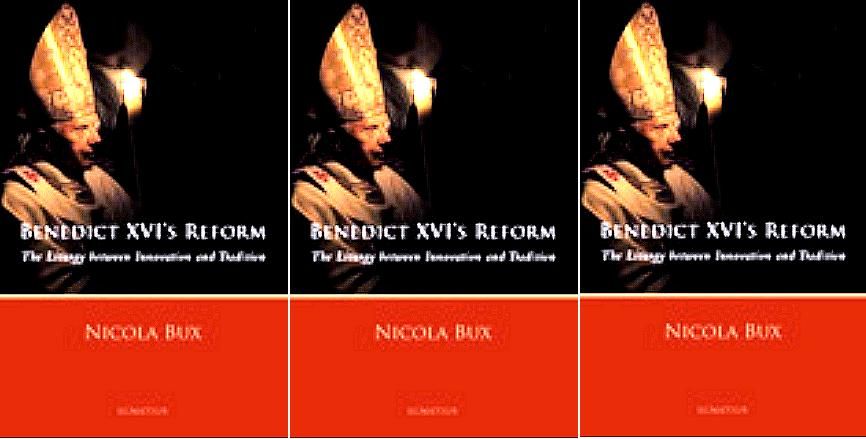 Ignatius Press releases new book
Ignatius Press releases new book
on Benedict XVI's liturgy -
'between Tradition and innovation'
by Carl Olson

May 4, 2012
This is also Ignatius Press's blurb for the book:
When Benedict XVI reestablished the celebration of the older Latin Mass, voices of protest rose up from many sides. The widespread fear was -and is - that the Pope had revealed himself as the reactionary defender of tradition that many have accused him of being since he was the prefect of the Congregation for the Doctrine of the Faith, the former Holy Office.
Defenders of Benedict XVI have responded to these objections by explaining that the use of the Tridentine Rite is not a "step backward" to pre-Vatican II times, but rather a step forward. Now the Church can see what the older rite offered in terms of beauty, reverence, and meaning and perhaps desire more of those elements in the ordinary form of the Mass. [More than anything, it was a necessary corrective step of a grossly erroneous interpretation of the Vatican-II constitution on liturgical reform, Sacrosanctum concilium, as though it had abolished or invalidated the Tridentine form of the Mass which has been in use for over 500 years since the Council of Trent - and it clearly did not, although it led to the Novus Ordo, the current Mass form now designated as 'ordinary' as distinguished from the 'extraordinary' traditional Mass according to its 1962 revision by John XXIII.
A professor of theology and liturgy, the author of this book explains the motives behind the Pope's decision to allow two forms of the Mass. He does this by turning to the Pope's own theological and liturgical writings, but he also draws from his experiences on various Church commissions and in offices of the Roman Curia.
The author also brings to his subject an astute understanding of current social and spiritual trends both inside and outside the Church. Sensitive to modern man's hunger for the sacred, he desires with Pope Benedict XVI that the Mass be first and foremost a place of encounter with the living God.
Nicola Bux is a priest of the Archdiocese of Bari and a professor of eastern liturgy and sacramental theology. He has studied and taught in Jerusalem and in Rome. He is a consultor to the Congregations for the Doctrine of the Faith and for the Causes of Saints and consultant of the international Catholic theological journal Communio. He was recently named a consultor to the Office of Liturgical Celebrations of the Supreme Pontiff.
 |
| |
 05/05/2012 16:30 05/05/2012 16:30 |
|
| | | OFFLINE | | Post: 24.779
Post: 7.305 | Registrato il: 28/08/2005
Registrato il: 20/01/2009 | Administratore | Utente Master | |
|

 May 5, Saturday, Fourth Week of Easter
May 5, Saturday, Fourth Week of Easter
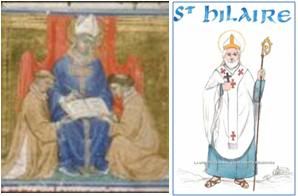 ST. HILAIRE D'ARLES [France, 403-449), Bishop and Confessor
ST. HILAIRE D'ARLES [France, 403-449), Bishop and Confessor
Not to be confused with the more famous Hilaire of Poitiers, Doctor of the Church,
this Hilaire followed the example of a relative who became a monk and then bishop
of Arles. He himself became bishop at age 29 and was an exemplary one in most
respects - he did manual labor to help the poor, sold Church vessels to ransom
Christian captives, became a 'magnificent' orator. But having episcopal primacy
over southern Gaul, he made arbitrary decisions about the bishops under him that
he forced Pope Leo the Great to intervene, stripping him of the power to consecrate
bishops and to call synods.
Readings for today's Mass: usccb.org/bible/readings/050512.cfm
AT THE VATICAN TODAY
The Holy Father met with
- H.E. Bamir Topi, President of the Republic of Albania, with his wife and delegation
- US bishops from Regions X-XIII who have been meeting in separate groups with the Holy Father during
their ad-limina visit. Address in English.
- Mons. Santo Gangemi, Apostolic Nuncio to Papua New Guinea and the Solomon Islands, with his family.
And in the afternoon with
- Cardinal Marc Ouellet, Prefect of the Congregation for Bishops (weekly meeting).

- The following entries from the running summary of Papacy/Vatican news headlines compiled by Yahoo shows what the UK and Irish media are exercised about these days:
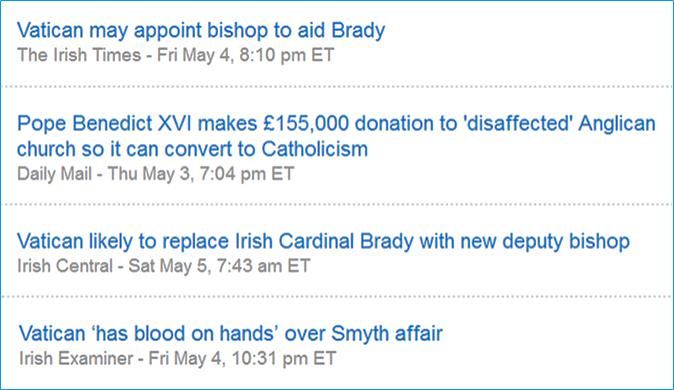 The Daily Mail is deliberately misrepresenting the Holy Father's donation to help the Ordinariate in England and Wales (something reported earlier in the week) to make it appear that the donation is specifically to enable 'disaffected' Anglicans to convert - whent he donation is for those who have already converted.
The Daily Mail is deliberately misrepresenting the Holy Father's donation to help the Ordinariate in England and Wales (something reported earlier in the week) to make it appear that the donation is specifically to enable 'disaffected' Anglicans to convert - whent he donation is for those who have already converted.
And the Irish media are feverishly fueling a new campaign to get Cardinal Sean Brady to resign as Arcbbishop of Armagh, using the recent mendacious BBC documentary to 'indict' him for supposed dereliction of duty. This had to do with an episode of child abuse into whose inquiry Brady had limited participation when he was a 36-year-old priest back in 1975 (See Cardinal Brady's full response to the BBC lies and misrrepresentations posted in the preceding page of this thread.) Such a campaign failed when they first tried it in late 2010-early 2011, but the BBC has given them a new 'pretext' to revive it, regardless of the facts. One must ask whether nthe Irish reading public is so 'mindless' in general that it will let the media do the thinking for them and ignore documented facts?
- The other papal news that the Anglopohone MSM played up earlier this week was that Benedict XVI will attend a performance of Beethoven's Ninth Symphony at La Scala Opera House in Milan when he visits that city for the World Encounter of Families - as if they were learning about it for the first time. It is a detail that was reported by all the media that were interested when the Pope's full program for his three-day visit to Milan June 1-June 3 was announced last month.
[Modificato da TERESA BENEDETTA 05/05/2012 21:54] |
| |
 05/05/2012 20:08 05/05/2012 20:08 |
|
| | | OFFLINE | | Post: 24.780
Post: 7.306 | Registrato il: 28/08/2005
Registrato il: 20/01/2009 | Administratore | Utente Master | |
|
|
| |
 05/05/2012 20:59 05/05/2012 20:59 |
|
| | | OFFLINE | | Post: 24.781
Post: 7.307 | Registrato il: 28/08/2005
Registrato il: 20/01/2009 | Administratore | Utente Master | |
|

 Pope to US bishops:
Pope to US bishops:
Catholic schools are essential
to the new evangelization

May 5, 2012
Pope Benedict XVI on Saturday spoke about the importance of Catholic education when addressing a group of United States bishops in Rome on their ad limina visit.
Calling Catholic schools “an essential resource for the new evangelization,” the Holy Father urged that a Catholic education be within the reach of all families, whatever their financial status.
Turning his attention to higher education, Pope Benedict said colleges and universities “need to reaffirm their distinctive identity in fidelity to their founding ideals and the Church’s mission in service of the Gospel.”
He said this includes the obligation for theological faculties to receive the mandate from the local bishop laid down in the Code of Canon Law.
“The question of Catholic identity, not least at the university level, entails much more than the teaching of religion or the mere presence of a chaplaincy on campus,” Pope Benedict told the bishops.
“All too often, it seems, Catholic schools and colleges have failed to challenge students to reappropriate their faith as part of the exciting intellectual discoveries which mark the experience of higher education,” he continued.
“The fact that so many new students find themselves dissociated from the family, school and community support systems that previously facilitated the transmission of the faith should continually spur Catholic institutions of learning to create new and effective networks of support.”
Here is the full text of Pope Benedict XVI’s discourse to the US bishops:
Dear Brother Bishops,
I greet all of you with affection in the Lord and I offer you my prayerful good wishes for a grace-filled pilgrimage ad limina Apostolorum.
In the course of our meetings I have been reflecting with you and your Brother Bishops on the intellectual and cultural challenges of the new evangelization in the context of contemporary American society. In the present talk, I wish to address the question of religious education and the faith formation of the next generation of Catholics in your country.
Before all else, I would acknowledge the great progress that has been made in recent years in improving catechesis, reviewing texts and bringing them into conformity with the Catechism of the Catholic Church.
Important efforts are also being made to preserve the great patrimony of America’s Catholic elementary and high schools, which have been deeply affected by changing demographics and increased costs, while at the same time ensuring that the education they provide remains within the reach of all families, whatever their financial status.
As has often been mentioned in our meetings, these schools remain an essential resource for the new evangelization, and the significant contribution that they make to American society as a whole ought to be better appreciated and more generously supported.
On the level of higher education, many of you have pointed to a growing recognition on the part of Catholic colleges and universities of the need to reaffirm their distinctive identity in fidelity to their founding ideals and the Church’s mission in service of the Gospel.
Yet much remains to be done, especially in such basic areas as compliance with the mandate laid down in Canon 812 for those who teach theological disciplines.
The importance of this canonical norm as a tangible expression of ecclesial communion and solidarity in the Church’s educational apostolate becomes all the more evident when we consider the confusion created by instances of apparent dissidence between some representatives of Catholic institutions and the Church’s pastoral leadership: such discord harms the Church’s witness and, as experience has shown, can easily be exploited to compromise her authority and her freedom.
It is no exaggeration to say that providing young people with a sound education in the faith represents the most urgent internal challenge facing the Catholic community in your country.
The deposit of faith is a priceless treasure which each generation must pass on to the next by winning hearts to Jesus Christ and shaping minds in the knowledge, understanding and love of his Church.
It is gratifying to realize that, in our day too, the Christian vision, presented in its breadth and integrity, proves immensely appealing to the imagination, idealism and aspirations of the young, who have a right to encounter the faith in all its beauty, its intellectual richness and its radical demands.
Here I would simply propose several points which I trust will prove helpful for your discernment in meeting this challenge.
First, as we know, the essential task of authentic education at every level is not simply that of passing on knowledge, essential as this is, but also of shaping hearts.
There is a constant need to balance intellectual rigor in communicating effectively, attractively and integrally, the richness of the Church’s faith with forming the young in the love of God, the praxis of the Christian moral and sacramental life and, not least, the cultivation of personal and liturgical prayer.
It follows that the question of Catholic identity, not least at the university level, entails much more than the teaching of religion or the mere presence of a chaplaincy on campus.
All too often, it seems, Catholic schools and colleges have failed to challenge students to re-appropriate their faith as part of the exciting intellectual discoveries which mark the experience of higher education.
The fact that so many new students find themselves dissociated from the family, school and community support systems that previously facilitated the transmission of the faith should continually spur Catholic institutions of learning to create new and effective networks of support.
In every aspect of their education, students need to be encouraged to articulate a vision of the harmony of faith and reason capable of guiding a life-long pursuit of knowledge and virtue.
As ever, an essential role in this process is played by teachers who inspire others by their evident love of Christ, their witness of sound devotion and their commitment to that sapientia Christiana (Christian wisdom) which integrates faith and life, intellectual passion and reverence for the splendor of truth both human and divine.
In effect, faith by its very nature demands a constant and all-embracing conversion to the fullness of truth revealed in Christ. He is the creative Logos, in whom all things were made and in whom all reality “holds together” (Col 1:17); he is the new Adam who reveals the ultimate truth about man and the world in which we live.
In a period of great cultural change and societal displacement not unlike our own, Augustine pointed to this intrinsic connection between faith and the human intellectual enterprise by appealing to Plato, who held, he says, that “to love wisdom is to love God”
(cf. De Civitate Dei, VIII, 8).
The Christian commitment to learning, which gave birth to the medieval universities, was based upon this conviction that the one God, as the source of all truth and goodness, is likewise the source of the intellect’s passionate desire to know and the will’s yearning for fulfilment in love.
Only in this light can we appreciate the distinctive contribution of Catholic education, which engages in a “diakonia of truth” inspired by an intellectual charity which knows that leading others to the truth is ultimately an act of love (cf. Address to Catholic Educators, Washington, 17 April 2008).
Faith’s recognition of the essential unity of all knowledge provides a bulwark against the alienation and fragmentation which occurs when the use of reason is detached from the pursuit of truth and virtue; in this sense, Catholic institutions have a specific role to play in helping to overcome the crisis of universities today.
Firmly grounded in this vision of the intrinsic interplay of faith, reason and the pursuit of human excellence, every Christian intellectual and all the Church's educational institutions must be convinced, and desirous of convincing others, that no aspect of reality remains alien to, or untouched by, the mystery of the redemption and the Risen Lord’s dominion over all creation.
During my Pastoral Visit to the United States, I spoke of the need for the Church in America to cultivate “a mindset, an intellectual culture which is genuinely Catholic” (cf. Homily at Nationals Stadium, Washington, 17 April 2008).
Taking up this task certainly involves a renewal of apologetics and an emphasis on Catholic distinctiveness; ultimately however it must be aimed at proclaiming the liberating truth of Christ and stimulating greater dialogue and cooperation in building a society ever more solidly grounded in an authentic humanism inspired by the Gospel and faithful to the highest values of America=s civic and cultural heritage.
At the present moment of your nation’s history, this is the challenge and opportunity awaiting the entire Catholic community, and it is one which the Church’s educational institutions should be the first to acknowledge and embrace.
In concluding these brief reflections, I wish to express once more my gratitude, and that of the whole Church, for the generous commitment, often accompanied by personal sacrifice, shown by so many teachers and administrators who work in the vast network of Catholic schools in your country.
To you, dear Brothers, and to all the faithful entrusted to your pastoral care, I cordially impart my Apostolic Blessing as a pledge of wisdom, joy and peace in the Risen Lord.

 Pope to US bishops:
Pope to US bishops:
Catholic schools are essential
to the new evangelization

May 5, 2012
Pope Benedict XVI on Saturday spoke about the importance of Catholic education when addressing a group of United States bishops in Rome on their ad limina visit.
Calling Catholic schools “an essential resource for the new evangelization,” the Holy Father urged that a Catholic education be within the reach of all families, whatever their financial status.
Turning his attention to higher education, Pope Benedict said colleges and universities “need to reaffirm their distinctive identity in fidelity to their founding ideals and the Church’s mission in service of the Gospel.”
He said this includes the obligation for theological faculties to receive the mandate from the local bishop laid down in the Code of Canon Law.
“The question of Catholic identity, not least at the university level, entails much more than the teaching of religion or the mere presence of a chaplaincy on campus,” Pope Benedict told the bishops.
“All too often, it seems, Catholic schools and colleges have failed to challenge students to reappropriate their faith as part of the exciting intellectual discoveries which mark the experience of higher education,” he continued.
“The fact that so many new students find themselves dissociated from the family, school and community support systems that previously facilitated the transmission of the faith should continually spur Catholic institutions of learning to create new and effective networks of support.”
Here is the full text of Pope Benedict XVI’s discourse to the US bishops:
Dear Brother Bishops,
I greet all of you with affection in the Lord and I offer you my prayerful good wishes for a grace-filled pilgrimage ad limina Apostolorum.
In the course of our meetings I have been reflecting with you and your Brother Bishops on the intellectual and cultural challenges of the new evangelization in the context of contemporary American society. In the present talk, I wish to address the question of religious education and the faith formation of the next generation of Catholics in your country.
Before all else, I would acknowledge the great progress that has been made in recent years in improving catechesis, reviewing texts and bringing them into conformity with the Catechism of the Catholic Church.
Important efforts are also being made to preserve the great patrimony of America’s Catholic elementary and high schools, which have been deeply affected by changing demographics and increased costs, while at the same time ensuring that the education they provide remains within the reach of all families, whatever their financial status.
As has often been mentioned in our meetings, these schools remain an essential resource for the new evangelization, and the significant contribution that they make to American society as a whole ought to be better appreciated and more generously supported.
On the level of higher education, many of you have pointed to a growing recognition on the part of Catholic colleges and universities of the need to reaffirm their distinctive identity in fidelity to their founding ideals and the Church’s mission in service of the Gospel.
Yet much remains to be done, especially in such basic areas as compliance with the mandate laid down in Canon 812 for those who teach theological disciplines.
The importance of this canonical norm as a tangible expression of ecclesial communion and solidarity in the Church’s educational apostolate becomes all the more evident when we consider the confusion created by instances of apparent dissidence between some representatives of Catholic institutions and the Church’s pastoral leadership: such discord harms the Church’s witness and, as experience has shown, can easily be exploited to compromise her authority and her freedom.
It is no exaggeration to say that providing young people with a sound education in the faith represents the most urgent internal challenge facing the Catholic community in your country.
The deposit of faith is a priceless treasure which each generation must pass on to the next by winning hearts to Jesus Christ and shaping minds in the knowledge, understanding and love of his Church.
It is gratifying to realize that, in our day too, the Christian vision, presented in its breadth and integrity, proves immensely appealing to the imagination, idealism and aspirations of the young, who have a right to encounter the faith in all its beauty, its intellectual richness and its radical demands.
Here I would simply propose several points which I trust will prove helpful for your discernment in meeting this challenge.
First, as we know, the essential task of authentic education at every level is not simply that of passing on knowledge, essential as this is, but also of shaping hearts.
There is a constant need to balance intellectual rigor in communicating effectively, attractively and integrally, the richness of the Church’s faith with forming the young in the love of God, the praxis of the Christian moral and sacramental life and, not least, the cultivation of personal and liturgical prayer.
It follows that the question of Catholic identity, not least at the university level, entails much more than the teaching of religion or the mere presence of a chaplaincy on campus.
All too often, it seems, Catholic schools and colleges have failed to challenge students to re-appropriate their faith as part of the exciting intellectual discoveries which mark the experience of higher education.
The fact that so many new students find themselves dissociated from the family, school and community support systems that previously facilitated the transmission of the faith should continually spur Catholic institutions of learning to create new and effective networks of support.
In every aspect of their education, students need to be encouraged to articulate a vision of the harmony of faith and reason capable of guiding a life-long pursuit of knowledge and virtue.
As ever, an essential role in this process is played by teachers who inspire others by their evident love of Christ, their witness of sound devotion and their commitment to that sapientia Christiana (Christian wisdom) which integrates faith and life, intellectual passion and reverence for the splendor of truth both human and divine.
In effect, faith by its very nature demands a constant and all-embracing conversion to the fullness of truth revealed in Christ. He is the creative Logos, in whom all things were made and in whom all reality “holds together” (Col 1:17); he is the new Adam who reveals the ultimate truth about man and the world in which we live.
In a period of great cultural change and societal displacement not unlike our own, Augustine pointed to this intrinsic connection between faith and the human intellectual enterprise by appealing to Plato, who held, he says, that “to love wisdom is to love God”
(cf. De Civitate Dei, VIII, 8).
The Christian commitment to learning, which gave birth to the medieval universities, was based upon this conviction that the one God, as the source of all truth and goodness, is likewise the source of the intellect’s passionate desire to know and the will’s yearning for fulfilment in love.
Only in this light can we appreciate the distinctive contribution of Catholic education, which engages in a “diakonia of truth” inspired by an intellectual charity which knows that leading others to the truth is ultimately an act of love (cf. Address to Catholic Educators, Washington, 17 April 2008).
Faith’s recognition of the essential unity of all knowledge provides a bulwark against the alienation and fragmentation which occurs when the use of reason is detached from the pursuit of truth and virtue; in this sense, Catholic institutions have a specific role to play in helping to overcome the crisis of universities today.
Firmly grounded in this vision of the intrinsic interplay of faith, reason and the pursuit of human excellence, every Christian intellectual and all the Church's educational institutions must be convinced, and desirous of convincing others, that no aspect of reality remains alien to, or untouched by, the mystery of the redemption and the Risen Lord’s dominion over all creation.
During my Pastoral Visit to the United States, I spoke of the need for the Church in America to cultivate “a mindset, an intellectual culture which is genuinely Catholic” (cf. Homily at Nationals Stadium, Washington, 17 April 2008).
Taking up this task certainly involves a renewal of apologetics and an emphasis on Catholic distinctiveness; ultimately however it must be aimed at proclaiming the liberating truth of Christ and stimulating greater dialogue and cooperation in building a society ever more solidly grounded in an authentic humanism inspired by the Gospel and faithful to the highest values of America=s civic and cultural heritage.
At the present moment of your nation’s history, this is the challenge and opportunity awaiting the entire Catholic community, and it is one which the Church’s educational institutions should be the first to acknowledge and embrace.
In concluding these brief reflections, I wish to express once more my gratitude, and that of the whole Church, for the generous commitment, often accompanied by personal sacrifice, shown by so many teachers and administrators who work in the vast network of Catholic schools in your country.
To you, dear Brothers, and to all the faithful entrusted to your pastoral care, I cordially impart my Apostolic Blessing as a pledge of wisdom, joy and peace in the Risen Lord.
As usual, both CNS and CNA are taking their weekend off - it's hard to understand this highly unprofessional practice, since news is a 365/24/7 proposition, and every respectable news agency can certainly afford to rotate their personnel so that at least someone is on duty on weekends to report Church events. (For instance, though the Vatican newspaper religiously observes every Sunday and religious holiday by not publishing anything on that particular day, Vatican Radio does not take Sundays or religious holidays off! If only because Saturday is always a working day for the Pope, and Sunday, besides the Pope's Angelus, never ought to be taken for granted, because one never knows what could be happening elsewhere that impacts the Church and the Pope!
And so, we have the strange situation of the USCCB's own news agency, CNS, not reporting on their meeting with the Pope today. CNS will probably file one on Monday and backdate it to Saturday as they often do... Anyway, CNS did have a story about the visiting US bishops from yesterday...
US bishops reflect on their role
in the new evangelization
By Cindy Wooden

ROME, May 4 (CNS) -- Celebrating Mass in Pope Benedict XVI's cathedral, Rome's Basilica of St. John Lateran, a group of U.S. bishops prayed for the Pope and reflected on what they need to do to respond to his call for a new evangelization.
Bishop Michael J. Sheridan of Colorado Springs was the homilist and principal celebrant of an evening Mass May 3 during the "ad limina" visit of bishops from Colorado, Arizona, New Mexico and Wyoming.
On the eve of the bishops' meeting with Pope Benedict, Bishop Sheridan led his fellow bishops in a reflection on the Pope's insistence that strengthening the faith of Catholics, reviving the faith of those who have fallen away and sharing the Gospel with others means they must preach that Jesus is the son of God and continues to live in the Church and the Eucharist.
The bishop said Pope Benedict has noted how "Jesus is often reduced to the status of a wise man and his divinity is diminished, if not denied outright." That type of attitude ignores the radical novelty of Christianity and its message that God entered human history to save humanity, he said.
The Pope "warned us of preaching a Jesus who was not alive in our midst, from entering into some sort of nostalgia in which we lift up Jesus the wise man who lived long ago, but doesn't seem to have any reality now, and it's only his memory that we exalt," the bishop said.
"Our proclamation must be the proclamation of the living Jesus; the one who died -- yes -- for our sins, but who was raised, who lives now never to die again, who is in our midst," he said.
"Let's pray today that the Lord will fire us up with his Holy Spirit so that we may join in this new evangelization in the most effective way," Bishop Sheridan said.
The bishops' visits are formally described as "ad limina apostolorum," which means "to the thresholds of the apostles" Peter and Paul, who were martyred in Rome. As well as concelebrating Masses at Rome's four major basilicas, the bishops meet with Pope Benedict to report on the state of their dioceses, and with Vatican officials to discuss issues of common concern.
Here's how AFP reported the Pope's address. Note the tendentious headline - in which a secular news agency calls the Christian message and Catholic identity 'the Vatican script' rather than basic Catholic doctrine.
Pope asks US bishops
to keep to the Vatican script

ROME, May 5, 2012 (AFP)- Pope Benedict XVI asked bishops Saturday to ensure that religious teachings are authorised by the Catholic Church, in a bid to keep US Catholics in line with the Vatican
. [Not in line with 'the Vatican' but in line with what the Church has always taught!]
The appeal comes after the Vatican last month upbraided a US association of Catholic clergy women for its feminist and liberal stances on contraception, homosexuality and female priests. [Which are all in open contradiction of what the Church teaches!]
"Such discord harms the Church's witness and, as experience has shown, can easily be exploited to compromise her authority and her freedom," the Pope said in a speech.
He referred to an article of Catholic rules that specifies clergy must receive approval from the Vatican for the contents of their teachings.
"The importance of this canonical norm ... becomes all the more evident when we consider the confusion created by instances of apparent dissidence between some representatives of Catholic institutions and the Church's pastoral leadership," the Pope said.
Catholic leaders in the US are split between an ultra-conservative wing [Not in this case - when not just the 'u;ltra-conservative wing' but majority if not all the US bishops, as well as leaders of other religions in the United States, are behind the official objections of the USCCB], which has slammed President Barack Obama's reforms that include contraceptive requirements in health care coverage, and other Church leaders who have taken more liberal stances on homosexuality and other issues. [The point that secular media like the AFP insist on ignoring when reporting about the Catholic Church is that no single Catholic - not even the Pope for that matter - should profess any 'stance' that directly contradicts official Church teaching! It is not a question of being 'more liberal' - it's a question of outright defiance of Church teaching. How would the media report it if dissident Tibetan Buddhists - if there are any - chose to openly say that they will not be limited to strictly non-violent means to advocate their beliefs? Religious doctrine, if it is authentic, is meant to be immutable - as are the teachings of Christ and his Church - unlike political and government policies that are subject to every public whim and opinion, not to mention the verdict of free and democratic polls. The Catholic faith is not something that will ever be put to a vote!]
For the Pope, who has been receiving groups of US bishops for regular work sessions, the rejection of abortion and euthanasia are "non-negotiables" that the Church must defend.
As usual, both CNS and CNA are taking their weekend off - it's hard to understand this highly unprofessional practice, since news is a 365/24/7 proposition, and every respectable news agency can certainly afford to rotate their personnel so that at least someone is on duty on weekends to report Church events. (For instance, though the Vatican newspaper religiously observes every Sunday and religious holiday by not publishing anything on that particular day, Vatican Radio does not take Sundays or religious holidays off! If only because Saturday is always a working day for the Pope, and Sunday, besides the Pope's Angelus, never ought to be taken for granted, because one never knows what could be happening elsewhere that impacts the Church and the Pope!
And so, we have the strange situation of the USCCB's own news agency, CNS, not reporting on their meeting with the Pope today. CNS will probably file one on Monday and backdate it to Saturday as they often do... Anyway, CNS did have a story about the visiting US bishops from yesterday...
US bishops reflect on their role
in the new evangelization
By Cindy Wooden

ROME, May 4 (CNS) -- Celebrating Mass in Pope Benedict XVI's cathedral, Rome's Basilica of St. John Lateran, a group of U.S. bishops prayed for the Pope and reflected on what they need to do to respond to his call for a new evangelization.
Bishop Michael J. Sheridan of Colorado Springs was the homilist and principal celebrant of an evening Mass May 3 during the "ad limina" visit of bishops from Colorado, Arizona, New Mexico and Wyoming.
On the eve of the bishops' meeting with Pope Benedict, Bishop Sheridan led his fellow bishops in a reflection on the Pope's insistence that strengthening the faith of Catholics, reviving the faith of those who have fallen away and sharing the Gospel with others means they must preach that Jesus is the son of God and continues to live in the Church and the Eucharist.
The bishop said Pope Benedict has noted how "Jesus is often reduced to the status of a wise man and his divinity is diminished, if not denied outright." That type of attitude ignores the radical novelty of Christianity and its message that God entered human history to save humanity, he said.
The Pope "warned us of preaching a Jesus who was not alive in our midst, from entering into some sort of nostalgia in which we lift up Jesus the wise man who lived long ago, but doesn't seem to have any reality now, and it's only his memory that we exalt," the bishop said.
"Our proclamation must be the proclamation of the living Jesus; the one who died -- yes -- for our sins, but who was raised, who lives now never to die again, who is in our midst," he said.
"Let's pray today that the Lord will fire us up with his Holy Spirit so that we may join in this new evangelization in the most effective way," Bishop Sheridan said.
The bishops' visits are formally described as "ad limina apostolorum," which means "to the thresholds of the apostles" Peter and Paul, who were martyred in Rome. As well as concelebrating Masses at Rome's four major basilicas, the bishops meet with Pope Benedict to report on the state of their dioceses, and with Vatican officials to discuss issues of common concern.
[Modificato da TERESA BENEDETTA 06/05/2012 19:14] |
| |
 05/05/2012 22:55 05/05/2012 22:55 |
|
| | | OFFLINE | | Post: 24.782
Post: 7.308 | Registrato il: 28/08/2005
Registrato il: 20/01/2009 | Administratore | Utente Master | |
|

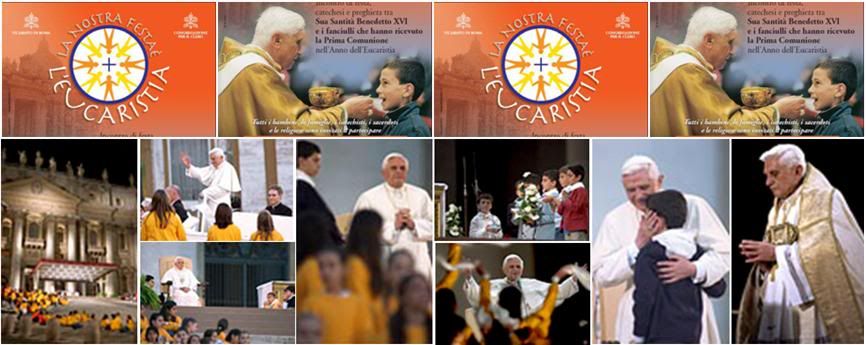 Pope Benedict speaks to Roman children about First Communion, St. Peter's Square, October 2005.
Bringing the Pope to
Pope Benedict speaks to Roman children about First Communion, St. Peter's Square, October 2005.
Bringing the Pope to
your child's first Communion
Artist speaks of transmitting
B16's words in a children's book
By Kathleen Naab

SAN FRANCISCO, California, MAY 4, 2012 (Zenit.org).- Benedict XVI himself has noted that it is the season for First Communions, and has given advice for making it a faith-filled celebration.
Those looking to follow his advice might consider a gift that will help young First Communicants to grow in their appreciation of the Eucharist.
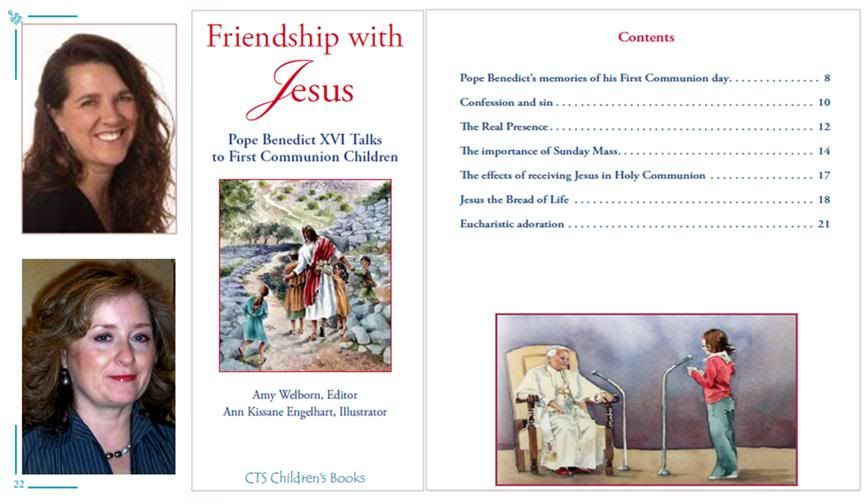
Amy Welborn and illustrator Ann Kissane Engelhart have created a children's book using the Pope's own words as he spoke with a group of children in Rome who had recently made their First Communion. "Friendship With Jesus" is a large-size, 25-page book, with a simple question and answer on each page, accompanied by Kissane Engelhart's watercolor drawings.
ZENIT spoke with Kissane Engelhart about the project, and also about her perspectives on Christian art in our day.
Your illustrations and this book have attempted to make a Pope's words accessible to children. How possible is this venture?
It was possible due to Pope Benedict’s sensitivity to the pastoral needs of his audience. The book is based on his answers to children’s questions about the Eucharist. His responses were profound, but in words that children can understand. The simplicity of his language and the imagery of his examples spoke to me as well, and thereby made my job as an illustrator easier.
As an artist, how do you see your role in making something as mysterious as the Eucharist understandable for a child?
I feel a responsibility to reflect the Pope’s words clearly and accurately through my paintings, while capturing something of the mystery and beauty of the sacrament. Watercolor, the medium that I work in, has an ethereal quality well-suited to the subject matter, and has enabled me to describe the ephemeral character of rising incense, the sun setting over St. Peter’s Square, as well as the innocence of a child preparing for First Holy Communion, in a way that captures a child's imagination.
You speak of being fascinated with Benedict's writings. What is it about him that has most caught your attention?
My theological background was virtually nonexistent before I began reading Pope Benedict’s books and papal writings. I found his perspective to contain fresh, new ways of looking at Scripture and Church teaching, as it relates to our daily life, opening windows of understanding.
His clever use of metaphors is surprising and provocative. I am also continually struck by the humble, kindly and authentic way he interacts with the faithful ... particularly young people. He radiates a joyful yet quiet charisma.
This Pope is a great advocate of "beauty" and is constantly encouraging the arts -- whether in sacred music, or in liturgy, or in other areas. From an artist's perspective, is there hope that Christian art can again regain some of the glory it had in past centuries?
I just returned from a trip to Italy. With that in mind, frankly, it is difficult to imagine how we could ever reproduce the extraordinary influence the Church had on the culture, particularly in the areas of art and architecture as is reflected in the glorious churches of Europe. But there is hope!
In recent centuries, art has been associated with rebellion, especially against institutions, so many of the important artists had complicated relationships with the Church. But now, paradoxically, I can see many artists, especially writers, musicians and filmmakers who are rebelling from the banality of the present culture, and who are inspired by their faith to reflect something of the beauty and richness of the Gospel.
Today, the great challenge for artists is not a lack of inspiration, but a lack of funding. It is essential for the Church and for individual Catholics to appreciate, as Pope Benedict does, the importance of “beauty” in evangelization and to support and encourage its expression in the practice of their faith.
Do you have a sequel planned for "Friendship With Jesus"?
Catholic Truth Society recently published our new book, "Be Saints! An Invitation from Pope Benedict XVI," which is based on the wonderful talk he gave to students in the United Kingdom on his pastoral visit. It will be available in the U.S. soon through Ignatius Press. Amy Welborn and I also have other faith inspired projects that we are working on, some of which I researched while traveling in Italy.
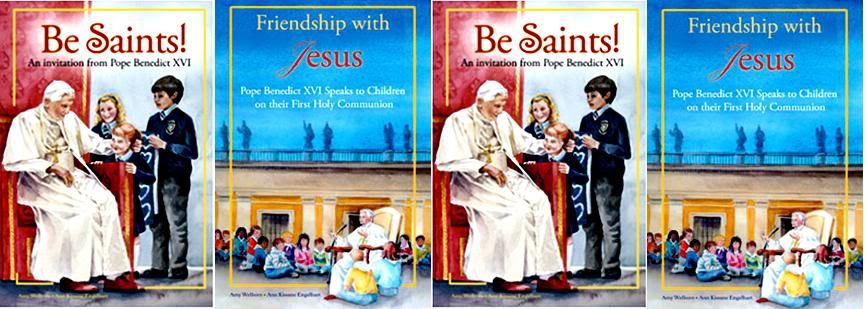 [Modificato da TERESA BENEDETTA 05/05/2012 22:56] |
| |
 06/05/2012 00:01 06/05/2012 00:01 |
|
| | | OFFLINE | | Post: 24.783
Post: 7.309 | Registrato il: 28/08/2005
Registrato il: 20/01/2009 | Administratore | Utente Master | |
|

 I must apologize for failing to post this important story yesterday in a timely manner.
Archbishop Chaput starts cleaning out
I must apologize for failing to post this important story yesterday in a timely manner.
Archbishop Chaput starts cleaning out
'rotten apples' among 26 accused priests

May 4, 2012
The Archdiocese of Philadelphia announced today that the work of a special team investigating the 26 priests publicly placed on leave by Cardinal Rigali last year is now largely done.
Archbishop Charles Chaput, O.F.M. Cap., has made final decisions in eight of the cases of the priests who were put on administrative leave following the February 2011 Grand Jury Report, which urged the Archdiocese to review cases of past allegations of sexual abuse of minors by clergy and some cases involving violations of the Standards of Ministerial Behavior and Boundaries.
“The process of reviewing these cases was designed to ensure that the decisions announced today reflect our commitment to protect children, assist victims, restore the integrity of the priesthood and provide evidence to the broader community that they can have confidence in these outcomes,” said Archbishop Chaput.
Through a rigorous investigative process, involving over 20 experts in child abuse, three of the priests have been found suitable for ministry and five have been found not suitable for ministry due to a substantiated allegation of sexual abuse of a minor or substantiated violation of the Standards of Ministerial Behavior and Boundaries.
One priest on leave died before the investigation was complete so no finding could be determined. The priests found unsuitable for ministry will have no public ministry in the Archdiocese. They do have the right to appeal the decision with the Holy See.
Depending upon the substantiated allegation, if they do not appeal, or if their appeal is unsuccessful, they could be laicized (removed from the clerical state), live under some supervision, or live a life of prayer and penance.
To lead these investigations the Archdiocese hired veteran child abuse prosecutor Gina Maisto Smith, who assembled a multidisciplinary team of experts. All cases of the priests on leave were referred to the appropriate local district attorney prior to investigation by the multidisciplinary team.
The multidisciplinary team, which reports to Smith, is composed of seven local and national authorities in the area of child sexual abuse, including a forensic psychiatrist, a psychologist who specializes in evaluating and treating sexual offenders, a pediatrician who leads the Child Protection Program at St. Christopher’s Hospital for Children, two former Philadelphia detectives from the Special Victims Unit, and two former Philadelphia assistant district attorneys.
To date, the multidisciplinary team has located, gathered and reviewed more than 400,000 pages of relevant documents; identified, located and interviewed 227 witnesses, across the United States and in several foreign countries; and conducted countless site visits to parishes and schools where incidents were alleged to have occurred.
Many cases involved a search for additional evidence including yearbooks, parish records, photographs and public documents. Some cases dated as far back in time as 40 years, which posed significant investigative challenges.
Mrs. Smith said, “We took care to develop a process that is thorough, impartial and fair. We recognize that allegations of child sexual abuse can be incendiary in nature. The stakes are high for both the accused and the accuser. Moreover, most child sexual abuse cases turn on credibility-the evaluation of word against word. Accordingly, the process must be painstakingly detailed. Its integrity is demonstrated by an exhaustive search for corroboration – a synthesis of witness interviews, documents and any additional available evidence, all of which must be analyzed in light of the expertise of the multidisciplinary team.”
When the multidisciplinary team forwarded its completed investigations to the Archbishop, he asked the Archdiocesan Review Board to also review the cases and to provide him with a recommendation. In the past year the Review Board added nine new members, some of whom were appointed by Archbishop Chaput and some by Cardinal Justin Rigali.
New Review Board members include a professor of forensic psychiatry, a former chief in the child abuse unit of the Philadelphia District Attorney’s office and a member of the Commonwealth of Pennsylvania Sexual Offender Assessment Board.
Not all of the administrative leave cases were announced today. Of those 26 men removed from active ministry last year six of the 26 cases are being held by law enforcement for further review. In addition, two more of the 26 cases were recently released by law enforcement and are currently under investigation by the multidisciplinary team.
Of the remaining nine cases, all investigations are complete and are pending examination by the Review Board or a final decision by Archbishop Chaput. Due to the ongoing process there is no indication as to when the resolutions of the remaining cases will be made, however the Archdiocese hopes to announce them as soon as possible.
“I’ve been in Philadelphia for less than a year, and I’ve tried as quickly as possible to understand all of the many issues facing our local Church,” said Archbishop Chaput. “During that time, dealing with sexual abuse and protecting children has been-and will remain-a top priority for me and for this Archdiocese. Our actions, including these outcomes and the steps we have taken to improve our policies and procedures, show that we have learned from the past. No lesson from the sexual abuse scandal is more important than the understanding that the people who suffer most are the victims.”
Last year, the Archdiocese separated the investigative function from its victim assistance program and created a distinct Office for Investigations.
Al Toczydlowski, former Philadelphia Deputy District Attorney, was appointed as the head of the newly developed office to ensure immediate referral to law enforcement, cooperation with county district attorney’s offices and thorough investigations as part of the canonical process.
The clear division between victim assistance and investigation allows Archdiocesan victim assistance efforts to focus exclusively on the needs of victims.
The Archdiocese also appointed Leslie Davila, who has more than 15 years of experience in working with victims of crime most recently with the Philadelphia District Attorney’s office, to lead this effort as the Director of the Office for Child and Youth Protection.
The Archdiocese is also finalizing new policies and procedures for handling allegations of sexual abuse of a minor, which will reflect lessons learned from the investigative process used to determine the cases announced today.
With the announcements of the resolution of these first cases, the Archdiocese will now begin a program that will provide support and assistance to parishioners as they and the Church come to terms with the past, seek to understand sexual violence, and create an environment that is safe and welcoming to those who have been victimized.
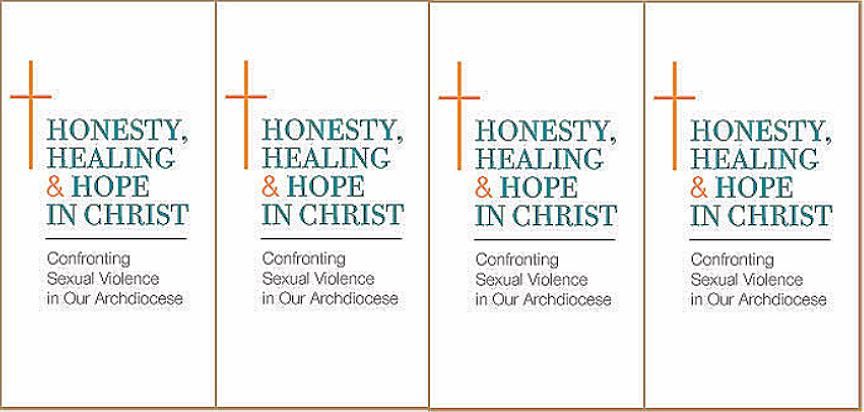
This initiative, entitled Honesty, Healing and Hope in Christ: Confronting Sexual Violence in Our Archdiocese, identifies three primary stakeholders: the victims of the allegation or violation of The Standards of Ministerial Behaviors and Boundaries, the parishioners who include school and Parish Religious Education Program (PREP) families, and the priests on administrative leave.
The plan, which consists of four phases over six months, is designed to address the feelings and responses experienced when final resolutions are announced and going forward.
Through the implementation of this initiative, the Archdiocese begins a journey of honesty, healing and hope toward the restoration of trust.
Archbishop Chaput's pastoral
letter to his flock
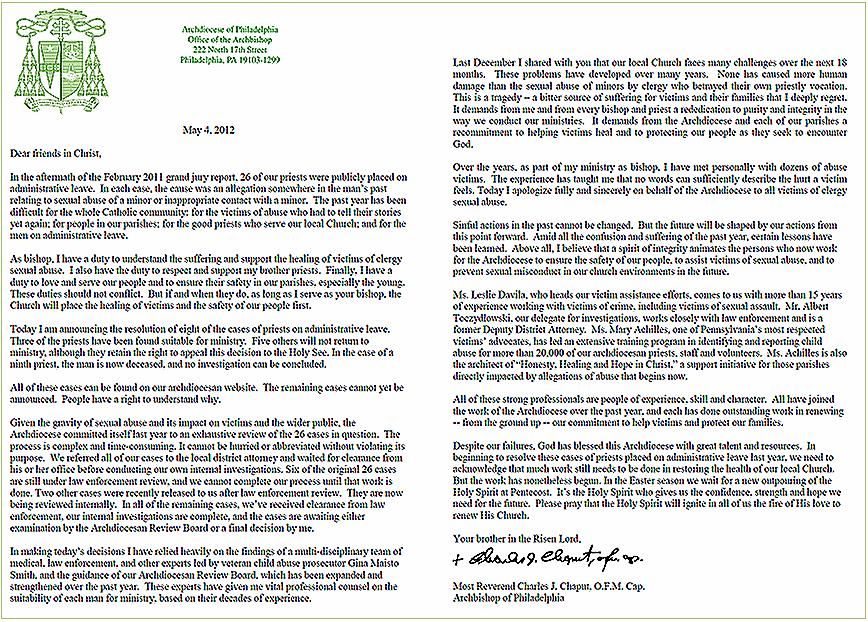 Here's how the New York Times reported the story. Mr. Hurdle appears to be a far more professional - because much more objective - reporter than, say, Laurie Goodstein or Rachel Donadio... He didn't even bring up Pope Benedict's name, which the two ladies would have managed to link to this particular episode in their lead paragraph...
5 Philadelphia priests
Here's how the New York Times reported the story. Mr. Hurdle appears to be a far more professional - because much more objective - reporter than, say, Laurie Goodstein or Rachel Donadio... He didn't even bring up Pope Benedict's name, which the two ladies would have managed to link to this particular episode in their lead paragraph...
5 Philadelphia priests
barred from ministry
By JON HURDLE

May 4, 2012
PHILADELPHIA — The Roman Catholic archbishop of Philadelphia announced Friday that five priests under investigation for sexual abuse would be permanently removed from ministry, while three other priests had been exonerated. The 8 were among 26 priests who were suspended in early 2011 because of past accusations of sexual abuse or improper sexual behavior.
The five who will be removed were deemed “unsuitable for ministry,” while the other three may return to active ministry immediately, said Archbishop Charles J. Chaput, announcing his first major action in the scandals since he took office last fall.
His predecessor, Cardinal Justin Rigali, suspended the 26 priests after a withering grand jury report in February 2011 accused the archdiocese of allowing as many as 37 priests to keep working, and remain in possible contact with children, despite “substantial evidence of abuse.”
At a news conference, Archbishop Chaput said that one of the priests in the grand jury report had died, and that church officials had not yet reached conclusions about 17 others. Six of those priests are still under criminal investigation by the Philadelphia district attorney’s office.
Eight other priests never named in the report were exonerated last year. Two others had already left the archdiocese.
The announcements were a small step forward for the 1.5-million member Archdiocese of Philadelphia, which has been racked by charges that widespread abuses were ignored, even as it struggles with contentious cutbacks in neighborhood Catholic schools and parishes.
“We cannot change the past, but I pray and I do believe that the lessons of the last year have made the church humbler, wiser and a more vigilant guardian of our children’s safety,” Archbishop Chaput said.
The grand jury allegations were especially shocking to many church members because they suggested that priests under investigation for abuse were still wearing the cloth years after the national church had declared a zero-tolerance policy.
When the suspensions were announced in February and March 2011, church critics called them long overdue and evidence of official failure to act. But many priests and church supporters called them an over-reaction to bad publicity, unfairly tarring priests who had not been credibly accused of crimes.
Some priests had been accused of serious sexual abuse, others of “boundary issues” violations like improper sexual conversations or light physical contact.
The grand jury report led to criminal charges against Msgr. William J. Lynn, who was responsible for looking into abuse claims but, it alleged, had been more concerned with shielding the Church from scandal. Monsignor Lynn, the most senior Church official in the country to be criminally indicted in the sexual abuse scandal, is on trial in Philadelphia on charges of conspiracy and child endangerment. He has pleaded not guilty.
At least one priest who was declared unfit this week has told friends that he is angry and innocent, and will appeal the decision.
Asked to describe his meetings with the priests whose investigations have concluded, Archbishop Chaput said they were “difficult, very difficult.” For those found suitable for ministry, he said, “there was great relief and joy.”
The five priests will be under permanent supervision from now on, the archbishop said. “Minimally, it would require a process of monitoring for the rest of their lives.”
The five will not face criminal charges, said Tasha Jamerson, a spokeswoman for the district attorney’s office, because the statute of limitations had run out by the time of the grand jury report.
Barbara Blaine, the president of the Survivors Network of those Abused by Priests, or SNAP, said Friday, “We are shocked that 14 months after a grand jury raised concerns over 37 accused priests, only eight of these cases are resolved.” [Aw, shut up already!]
This article has been revised to reflect the following correction (May 5, 2012):
In an earlier version of this article, a quote about the future of the priests was incorrectly attributed to Archbishop Charles J. Chaput. He did not say, “leading lives of prayer and penance and not allowed to wear a collar,” at the press conference.
An earlier version also incorrectly described the five priests as having been defrocked. They remain priests but have been barred from ministry.
[Modificato da TERESA BENEDETTA 06/05/2012 14:04] |
| |
 06/05/2012 13:59 06/05/2012 13:59 |
|
| | | OFFLINE | | Post: 24.784
Post: 7.310 | Registrato il: 28/08/2005
Registrato il: 20/01/2009 | Administratore | Utente Master | |
|
 The pontifical universities in Rome have been scheduling various conferences to discuss specific aspects of Vatican II on the 50th anniversary year of its opening, in the context of Benedict XVI's 'hermeneutic of renewal in continuity with tradition". Here is a final communique summarizing the International Congress on Vatican-II and the New Evangelization held May 3-4 at the Pontifical University of Santa Croce.
The pontifical universities in Rome have been scheduling various conferences to discuss specific aspects of Vatican II on the 50th anniversary year of its opening, in the context of Benedict XVI's 'hermeneutic of renewal in continuity with tradition". Here is a final communique summarizing the International Congress on Vatican-II and the New Evangelization held May 3-4 at the Pontifical University of Santa Croce.
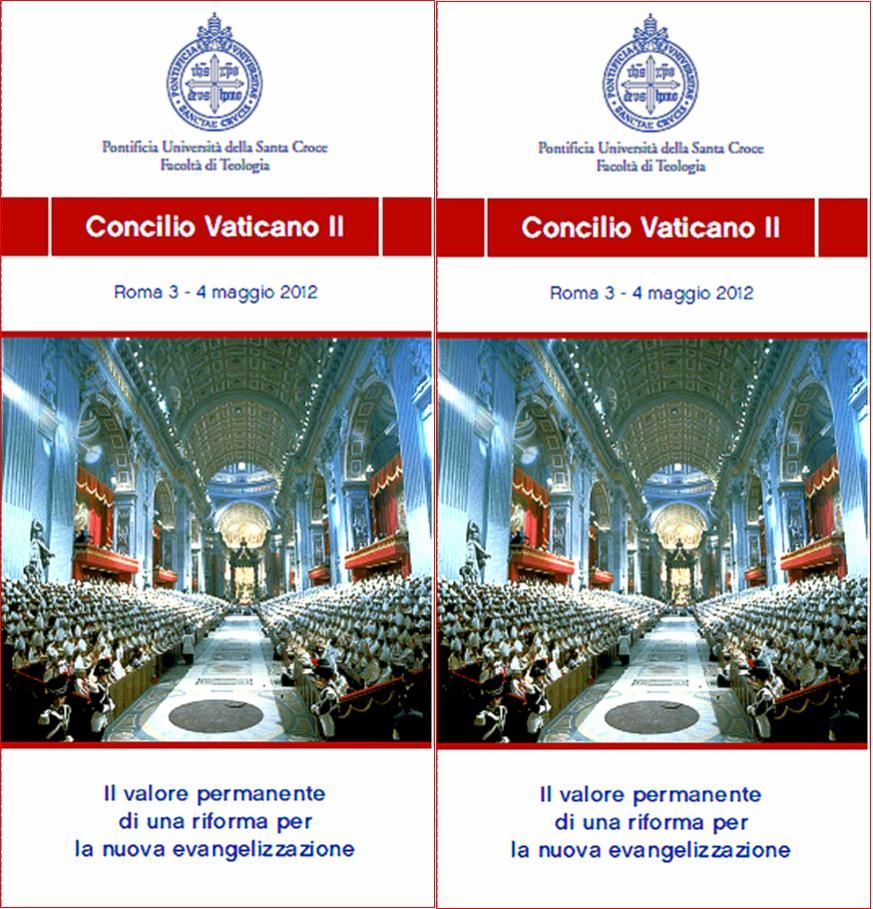 The Second Vatican Council:
The Second Vatican Council:
A new reading of the Christian faith
Translated from the Italian service of

ROME, May 4 (ZENIT.org) - The most incisive novelty of Vatican II was its "new reading of the Catholic faith, in order to refresh inter-relationships and give adequate proportion to all elements of Tradition after centuries of unilateral emphases".
Thus said Prof. Jose Ramon Villar of the University of Navarra (Spain), in his intervention at the International Congress on the theme, "The Second VaticanCouncil: The permanent value of reform for the new evangelization", which took place in Rome May 3-4 under the auspices of the Faculty of Theology of the Pontifical University of Santa Croce.
"Doctrinal novelties are always relative because, in some way, they must be contained within the Tradition of the Church," the Spanish scholar added. In the case of Vatican-II, "these (novelties) were not the apparition of something that had never said before, nor of any novelty unknown in teh Catholic tradition".
Rather, "as a rule, the novelty is always an internal development within Tradition itself, of aspects which for various circumstances, are better understood at a certain historical moment".
At this international congress, which was also sponsored by the Archbishop of Munich-Freising, Cardinal Reinhard Marx, about a hundred ecclesial experts and scholars from various universities around the world took part, offering a reading of Vatican-II according to "the hermeneutic of reform, of renewal in continuity of the single subject, the Church" that Benedict XVI underscored in his famous Christmas address to the Roman Curia in 2005, the first year of his Pontificate.
One section of the lectures was devoted to a strictly theological-historical perspective of the Council, while the rest were dedicated to an examination in depth of each of the 16 documents approved by the Council. They offered an overview of the drafting process that each text underwent, and the subsequent reception of each document after the Council.
This event is one of many initiatives undertaken in Rome in preparation for the 50th aniversary of the Vatican-II opening, the Yeqar of Faith proclaimed by the Holy Father, and the Synodal Assembly on the New Evangelization in October.
For Prof. Miguel de Salis, of the Unviersity of Santa Croce itself, the Council did not represent a kind of 'constituent assembly' but rather, "a manifestation of the Church which assembled its bishops to reflect on her historical journey thus far and on the renewal that was necessary in order to make her announcement more suitable to the needs of the times".
"In Catholic theology, reform and aggiornamento (keeping up to date) have meant, above all, looking into the question of personal conversion which can bring man more or less closer to God".
De Salis then underscored that "reform is always an act of faith, hope and charity, within which there is always the possibility of recognizing the errors of the Church, thus leading to her purification".
Reflecting on the constitution Sacrosanctum concilium and the consequent liturgical reform, a German professor of liturgy, Helmut Hoping (University of Freiburg im Bresgau), spoke of 'the renewal of liturgical practice' and the need for 'liturgical and mistagogical formation' for purposes of the New Evangelization.
Hoping pointed out how then-Cardinal Ratzinger had advocated 'a reform of the reform' in view of the danger of a 'superficial horizontalism in liturgy'.
In this respect, he said, Benedict XVI's recent magisterial interventions on liturgy do not represent "a retreat from the new nor a return to the old" but an expression of the need to "return to adoration, since liturgy is a sacred event".
Co mmenting on the declaration Nostra aetate, Mons. David Jaeger, OFM, of the Pontifical Antonianum University, clarified "its general obejective, which serves to exclude any relativistic reading of it".
In fact, he said, "relating to the non-Christian religions is not aimed towards making new discoveries about the truth or about the will of God, but rather, the Church has undertaken it in the context of her duty to promote unity and charity among men and among peoples".
Among the more evidents fruits of the Council is, withpout a doubt, "tyhe birth of new spiritual movements" and "a new flowering of entities that had been established long before" (religious orders and congregations) who have been "confirmed in their spirituality to help sanctify the world".
This was the opinion of Prof. Manfred Speier, of the Unviersity of Osnabruck (Austria), who offered an analysis of the pastoral constitution Gaudium et spes.
These new ecclesial entities, he said, "in their reception of Vatican II, have been oriented and are oriented to the hermeneutic of reform", united in "a joyous faith, in loyalty to the Church and the Magisterim of the Popes, as well as to the commitment assumed at baptism for lay apostolate work and witnessing to the faith in society".
Prof. Spieker concluded that they are also united in the conviction that "the Church does not need reformers but sains" and that "the Council was a gift of the Holy Spirit to the Church, a Pentecostal event that encourages laymen to live in the world and reinforces their ability to account to everyone for the faith and hope, of which they are bearers".
Prof. José Maria La Porte, dean of the Faculity of Comunications at Santa Croce, presented a panoramic view of the communications practices adopted during and after Vatican-II, by showing "some attitudes in the communications media" during the preparatory phase of the Council, the discussions on various topics within the Council and outside it, and the subsequent dissemination of the documents approved by the Council.
Specifically, he compared the perspective of ecclesial specialists and that which started to develop among journalists covering the event: "The media seemed to have decisively conditioned the subsequent dissemination and reception of the Council documents".[ What an understatement!]
Commenting on the declaration Dignitatis Humanae, Prof. Gerardo del Pozo, from the University of San Damaso in Madrid, explained how the document has helped "to better understand the novelty of the separation between politics and the faith taught by Jesus".
In fact, he said, "without looking to the Cross and the Resurrfection as the source in which the Church was born, she cannot understand the ultimate meaning of her own freedom, of Christian freedom and of religious freedom".
"It is not when she examines herself as an institution but when she continually seeks Christ that the Church can dialog with the entire world and therefore serve it in a truly Christian way", he concluded.
According to Prof. Johannes Grohe, dean of Church History at Santa Croce, Vatican II "is, and should remain. for the Catholic Church an expression of the solemn and supreme Magisterium of our time, and it should therefore have the corresonding importance in the ecumenical
dialog".
Moreover, he said, "the Vatican II texts must be accepted in the same way that the texts of the preceding ecum enicla councils of the Church have been accepted".
Finally, he pointed out, "a professiona fidei - profession of faith - that embraces the conciliar traditions from Nicaea to Vatican-II will show how the teachings of the latter fit into the long and fruitful history of the Church Magisterium".
[Modificato da TERESA BENEDETTA 06/05/2012 14:17] |
| |
 06/05/2012 15:05 06/05/2012 15:05 |
|
| | | OFFLINE | | Post: 24.785
Post: 7.311 | Registrato il: 28/08/2005
Registrato il: 20/01/2009 | Administratore | Utente Master | |
|
 After seven years, I am sure the Photo Service of the Vatican can now put together what would probably be the most fascinating 'baby book' ever - using the countless photos taken of Benedict XVI interacting with babies and toddlers. And I am very happy that Jose Manuel Vidal chose to comment on one such picture.
The Pope, his secretary and a baby
Translated from
After seven years, I am sure the Photo Service of the Vatican can now put together what would probably be the most fascinating 'baby book' ever - using the countless photos taken of Benedict XVI interacting with babies and toddlers. And I am very happy that Jose Manuel Vidal chose to comment on one such picture.
The Pope, his secretary and a baby
Translated from

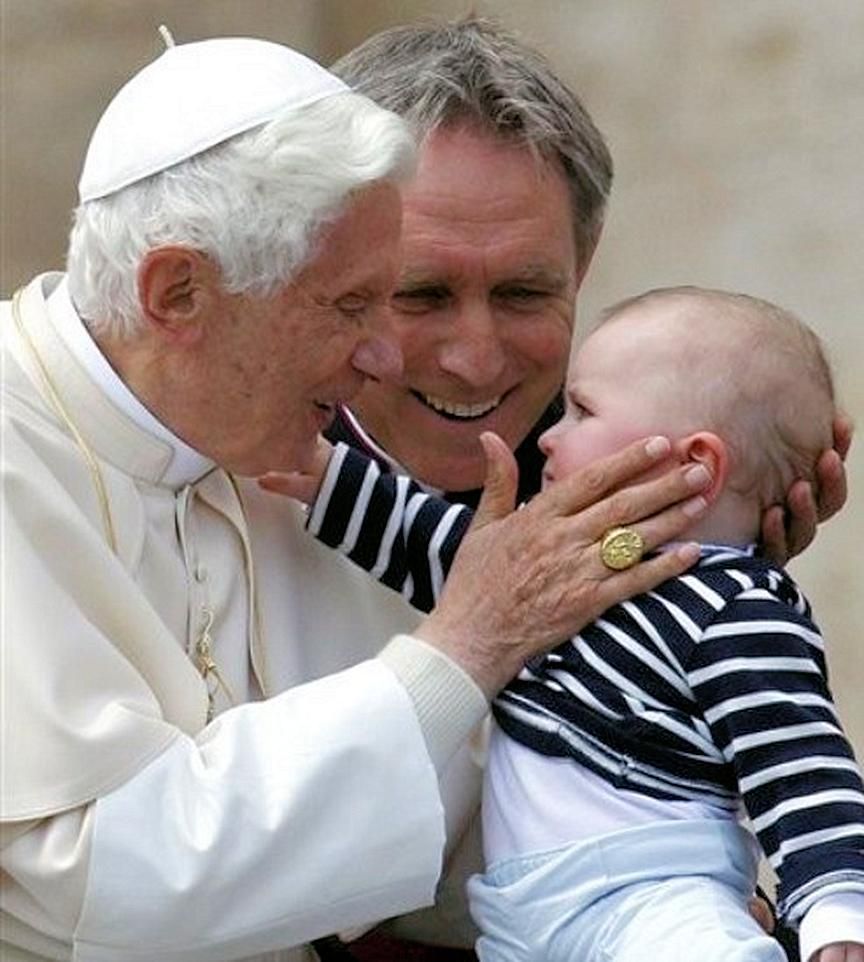
This is a gesture of love and sensitivity that is worth more than a thousand words!
The 85-year-old Pope. with all the weight of the Church on his frail shoulders, transformed into a 'happy grandfather'. He caresses the baby held up to him with his right hand, which carries the ring of Peter. And with his left hand, he tenderly supports the baby's head. As if he were used to doing this. As if he were a grandfather with so many grandchildren - which he is not, and is, at the same time.
With babies, Benedict XVI's look turns even more gentle and sweet, as his eyes seem to caress and treasure innocence. Beside him the face of his faithful secretary, Mons. Georg Gaenswein, also shines with joy. The baby, too, feels happy and holds out his little hand to the man in white.
A beautifully evocative image which brings together that of the Pope who is 'God's janitor' with that of childhood innocence abused by the rotten apples in the Catholic clergy.
The Church wages her own salvation - and her social credibility - on the protection of children. Woe to them who scandalize any of the little ones!, Jesus had exclaimed.
If tenderness can save the world, an image like this brings the Pope closer to our hearts. And humanizes him amidst any 'papolatry'. [Not that we Benaddicts need such images to bring him 'closer' to our hearts, since it's all part of who he is, to begin with. And Benaddiction, which is 100% love and admiration for this particular person who also happens to be Pope, is by no means robotic 'Papolatry'.]
It is a beautiful image of the humble worker in the vineyard of the Lord who caresses a baby with all the love he can express as a Pope and as a human being.
I've always felt that the images of the Pope - or any priest, including Mons. Gaenswein - in loving interaction with babies and children. are doubly poignant because surely, in the back of their minds is the thought that this particular baby or child could have been their own, but in not having their own children, they are then more able to be 'father' or 'grandfather' to all children, especially those who most need parental affection.
[Modificato da TERESA BENEDETTA 07/05/2012 02:02] |
| |
 06/05/2012 15:49 06/05/2012 15:49 |
|
| | | OFFLINE | | Post: 24.786
Post: 7.312 | Registrato il: 28/08/2005
Registrato il: 20/01/2009 | Administratore | Utente Master | |
|

 May 6, Fifth Sunday of Easter
Feast of Saints MARIAN AND JAMES (d North Africa, 259), Martyrs
May 6, Fifth Sunday of Easter
Feast of Saints MARIAN AND JAMES (d North Africa, 259), Martyrs
Little is known about them except that Marian (male) was a lector
and James a deacon, who were both killed for refusing to give up
their faith during the persecutions of the Emperor Valerian.
[Once again, unable to find any images online for the saintS of the day.]
Readings for today's Mass: usccb.org/bible/readings/050612.cfm
AT THE VATICAN TODAY
Regina caeli - The Holy Father reflected on today's Gospel about Jesus being the true vine, of which
the faithful are branches who must always be united with him through the Sacraments and charity.
He reminded the faithful that the VII World Encounter of Families will open on three weeks in
Milan, at which, God willing, he will be present for the concluding days. He took note of the annual
rally by the Italian-based association 'Meter' in behalf of child victims of abuse.
[Modificato da TERESA BENEDETTA 07/05/2012 02:03] |
| |
 06/05/2012 16:17 06/05/2012 16:17 |
|
| | | OFFLINE | | Post: 24.787
Post: 7.313 | Registrato il: 28/08/2005
Registrato il: 20/01/2009 | Administratore | Utente Master | |
|

 REGINA CAELI TODAY
REGINA CAELI TODAY
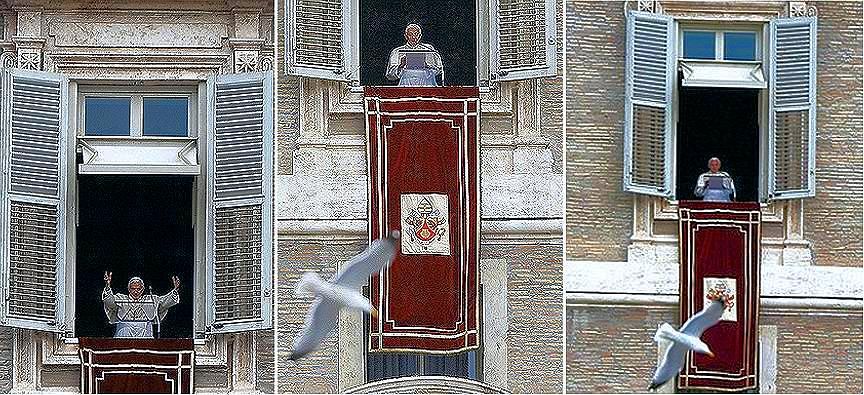
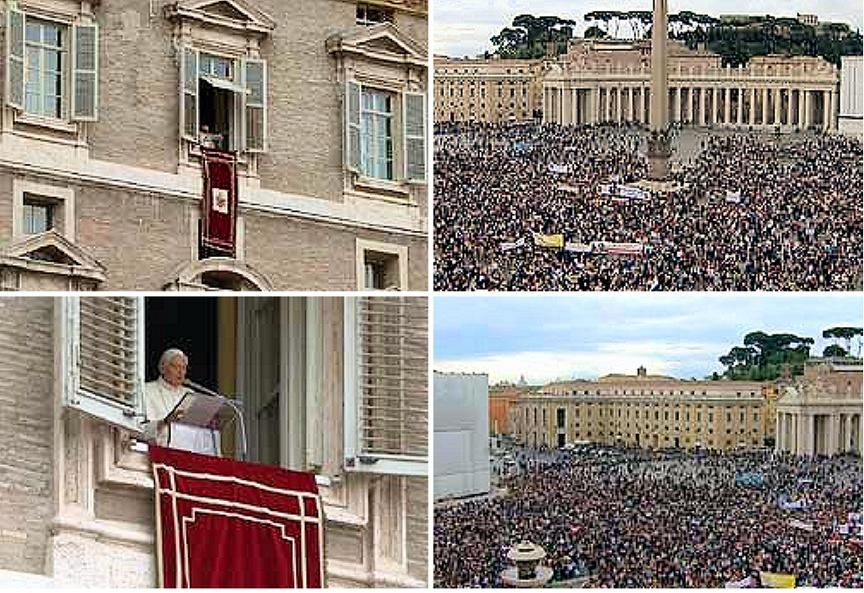 'Christ is the vine,
'Christ is the vine,
we are the branches'

May 6, 2012
In his message before for the Regina Coeli, Pope Benedict XVI spoke about the Gospel for today, the Fifth Sunday of Easter. He recalled the words of Christ, who said, “I am the true vine, and My Father is the vine-grower.”
“On the day of our Baptism,” the Pope said, “The Church grafts us as branches into the Paschal Mystery of Christ, into His own Person.”
In English, he said:
I extend warm greetings to the English-speaking visitors present for today’s Regina Coeli, and especially to the large group of pilgrims from Indonesia. In today’s Gospel Jesus speaks of himself as the true vine and He calls us to be fruit-bearing branches.
I pray that God’s children all over the world will grow in unity and love, sustained and nourished by the divine life that he has planted deep within us. May God bless all of you!
He called upon the faithful to bear in mind that “every one of us is like a vine, which lives only if it is growing every day in prayer, participation in the Sacraments, in charity, in its union with the Lord. And he who loves Jesus, the true vine, produces fruits of faith for an abundant spiritual harvest. Let us beseech the Mother of God that we might remain firmly grafted in Jesus and that all our actions may have their beginning, and their fulfillment, in Him.”
After the Regina Coeli prayer, the Holy Father greeted pilgrims and visitors from around the world. He reminded the faithful of the VII World Meeting of Families, taking place at the beginning of next month.
The Meeting is being sponsored by the Pontifical Council of the Family, headed by Cardinal Ennio Antonelli. The Holy Father thanked the Ambrosian Diocese and other dioceses in Lombardy who are cooperating in the preparation of this ecclesial event, and noted that, “I, too, God willing, will have the joy of participating” in the Meeting.
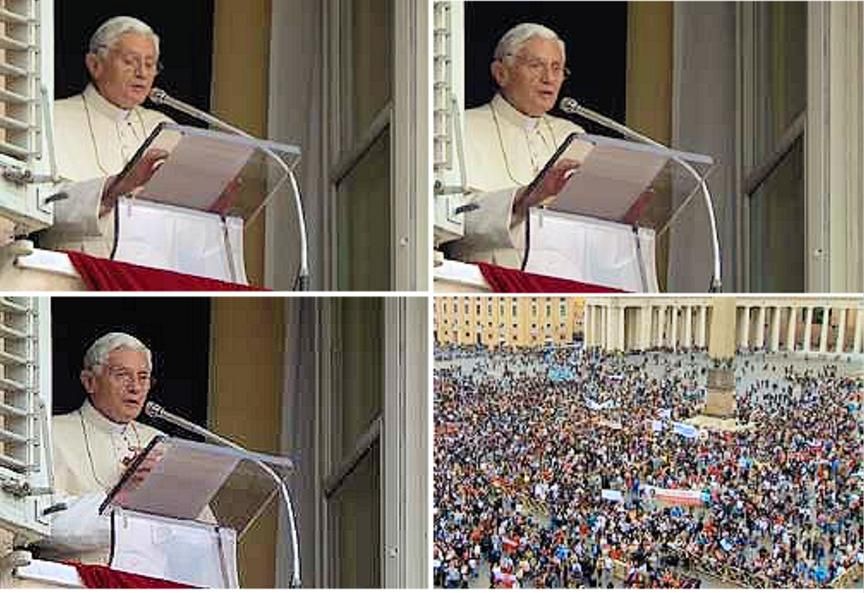
Here is a translation of the Holy Father's words today at the Regina caeli:
Dear brothers and sisters:
The Gospel today, the fifth Sunday of Easter, opens with the image of the vine. "Jesus said to his disciples: 'I am the true vine, and my Father is the vine grower.' (Jn 15.1)
Often, in the Bible, Israel is compared to the fruitful vine when she is faithful to God, but when she grows away from him, becomes sterile, unable to produce that "wine to gladden their hearts", as Psalm 104 sings (v 15).
The true vineyard of God, the true vine, is Jesus, who with his sacrifice of love gives us salvation, he opens for us the way to be part of this vineyard. And Just as Jesus remains in the love of God the Father, so the disciples, wisely empowered by the word of the Master (cfr Jn 2-4), if they were profoundly united to him, become fruitful branches which produce an abundant harvest.
St. Francis de Sales writes: "The branch that is united and conjoined to the trunk bears fruit not by its own virtue, but by virtue of the stock: we are united by charity to our Redeemer, like limbs to the head - and that is why... good works, tkaing their value from him, merit eternal life" (Trattato dell’amore di Dio, XI, 6, Roma 2011, 601).
On the day of our Baptism, the Church grafts us like branches to the Paschal mystery of Jesus, into his very Person. From this root, we receive the precious lymph to enable us to take part in divine life.
Like the disciples, we too, with the help of the Pastors of the Church, grow in the vineyard of the Lord bound by his love. "If the fruit that we must bear is love, its premise is precisely this 'remaining' which has to do profoundly with that faith that does not abandon the Lord" (GESU DI NAZARET, Milan 2007, p 305).
It is indispensable that we always remain united to Jesus, to depend on him, because without him, we can do nothing (cfr Jn 15,5).
In a letter written to John the Prophet, who lived in the desert of Gaza in the fifth century, a faithful follower asks him the following: How is it possible to hold together the freedom of man and the fact that he can do nothing without God?
And the monk responded: If man inclines his heart towards the good and asks God for help, he will receive the necessary strength to fulfill his own work. And that is why the freedom of man and the power of God proceed together. This is possible because good comes from the Lord, but it is fulfilled thanks to the faithful (cfr Ep. 763, SC 468, Paris 2002, 206).
Truly 'remaining' in Christ guarantees the efficacy of prayer, as the Cistercian Blessed Guerrico d'Igny noted: "Oh Lord Jesus, without you we can do nothing. Indeed you are the true gardener, creator, cultivator and guardian of your garden, who plants with your words, irrigates with your spirit, and makes us grow with your power" (Sermo ad excitandam devotionem in psalmodia, SC 202, 1973, 522).
Dear friends, each of us is like a branch, which lives only if it makes union with the Lord grow daily in prayer, in participation in the Sacraments, in charity.
Whoever loves Jesus, true vine, produces fruits of faith for an abundant spiritual harvest. Let us implore the Mother of God that we may remain firmly grafted to Jesus and that every action of ours can have its beginning and its fulfillment in him.
After the prayers, he said this:
First of all, I wish to remind you that in less than a month, the VII World Encounter of Families will take place in Milan. I thank the Ambrosian diocese and the other Lombard dioceses who are collaborating in preparing for this ecclesial event, promoted by the Pontifical Council for the Family, presided by Cardinal Ennio Antonelli.
I, too, God willing, will have the joy of participating in it, and for this, I will be in Milan from June 1-3.
After his plurilingual greetings to other language groups, he said this to the Italian-speaking faithful:
Finally, I address my heartfelt greeting to Italian-speaking pilgrims, especially the Associazione Meter ['meter' is a Greek word that means 'womb' as well as 'hospitality'], which is committed to the protection of children who are victims of abuse...
My special greeting to the new Swiss Guards and their families, on the annual feast day of this historic corps.
I wish everyone a good Sunday and a good month of May. in the spiritual company of Our Lady
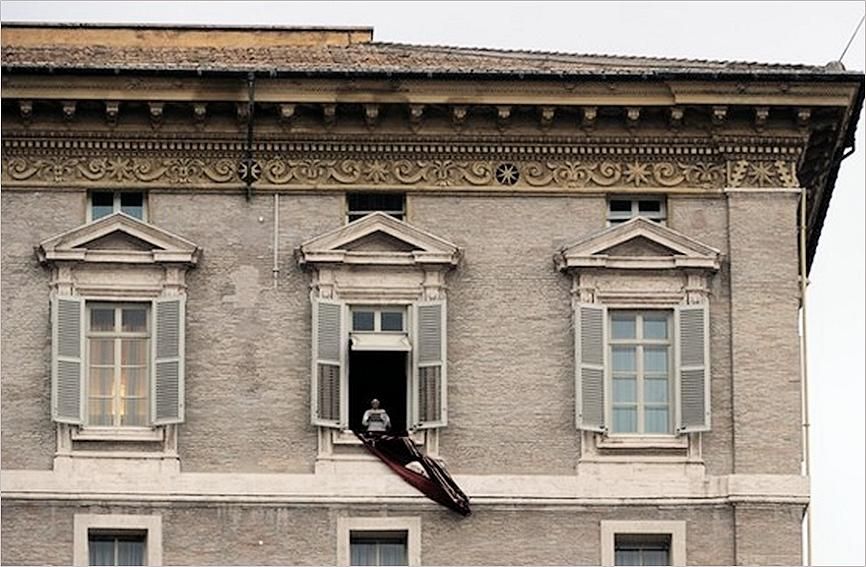
[Modificato da TERESA BENEDETTA 07/05/2012 01:34] |
| |
 06/05/2012 18:41 06/05/2012 18:41 |
|
| | | OFFLINE | | Post: 24.789
Post: 7.314 | Registrato il: 28/08/2005
Registrato il: 20/01/2009 | Administratore | Utente Master | |
|
 Father Z has bept a running count of various FSSPX distrrict superiors who have spoken out about the status of FSSPX negotiations with Rome and who appear to indicate that the FSSPX has substantially accepted the formulation proposed by the Vatican for the society's full recponciliation with the Church of Rome. Rorate caeli blogspot now offers one of the least unequivocal of those assessments, though it chooses to use a noncommittal title for the piece.
Important: FSSPX priest speaks
Father Z has bept a running count of various FSSPX distrrict superiors who have spoken out about the status of FSSPX negotiations with Rome and who appear to indicate that the FSSPX has substantially accepted the formulation proposed by the Vatican for the society's full recponciliation with the Church of Rome. Rorate caeli blogspot now offers one of the least unequivocal of those assessments, though it chooses to use a noncommittal title for the piece.
Important: FSSPX priest speaks
about recent developments

May 5, 2012
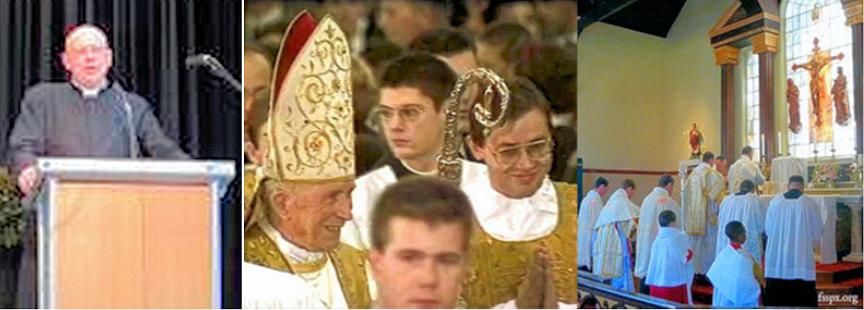 Left photo, Fr. Pfluger at last Sunday's lecture; center, the young Fr. Pfluger (right) assisting Mons. Lefebvre at a liturgy.
Left photo, Fr. Pfluger at last Sunday's lecture; center, the young Fr. Pfluger (right) assisting Mons. Lefebvre at a liturgy.
Fr. Niklaus Pfluger, FSSPX, is the First Assistant of the Superior General of the Society of Saint Pius X. He was the main speaker at a conference promoted in Hattersheim, Hesse, Germany, last Sunday, by the Actio Spes Unica association, during which he talked about Rome, the FSSPX, and the future.
The following is a translation of the official summary of the conference from the original German:
Agreement with Rome
despite doctrinal questions
'Nothing new' is how one could describe the first half hour of the lecture given by Fr. Niklaus Pfluger at this year’s Spes-Unica-Sunday, as the First Assistant of the Superior General of the SSPX recalled once more how the relationship with Rome has developed in recent years.
But then the conference hall in Hattersheim (Germany) got more and more excited as Fr. Pfluger unexpectedly started to unveil the events of the past years that have led to the present situation. And he also announced that these events prompted Bishop Fellay to set aside the principle that had previously guided negotiations with Rome.
The Pope’s desire for a solution
“No practical solution without doctrinal agreement” was the principle upon which the Society had started the talks with the Holy See. But the negotiations since 2009 have revealed that the different positions regarding central questions of doctrine cannot be bridged. [A fundamental problem with this formulation - reiterated many times in this summary - is that the four points disputed by the FSSPX about Vatican-II are not about fundamental Christian doctrine, but rather, new pastoral orientations for the Church.]
Recent weeks have revealed that the Pope is so interested in a canonical solution for the Society that he is ready to seal a deal, even if the Society does not recognize the disputed texts of Vatican II and the New Mass. Should the Society, however, refuse an agreement even under these circumstances, then new excommunications are a possible outcome.
The freedom to continue working in freedom
Under these circumstances the Superior General, Bishop Bernard Fellay, does not consider it possible to reject the Pope’s proposal. It would be tantamount to a lapse into Sedevacantism if one would still isolate oneself from the Pope’s wish, if this wish does not entail acknowledging false doctrine.
It also is a matter of prudence/wisdom not to cut all connections with Rome. One should keep at least one door open, even if at this moment there seems to be no proximity in doctrinal matters.
It is, of course, a pre-condition that an agreement will cover the assurance that the Society will be able to disagree from Rome’s positions in disputed matters and that it will have the freedom to continue her work in her entire apostolate. Part of an autonomous status would also be the right to criticize the Council and Modernism.
[I believe this was something that Rome agreed to in previous reconciliations with smaller offshoots of the FSSPX which decided to re-enter into full comunion with Rome in previous years.]
The offer to Archbishop Lefebvre and historical parallels
By way of support for Bishop Fellay’s decision, Fr. Pfluger recalled the way of action of Archbishop Lefebvre in 1987 and 1988. At that time the Archbishop proposed a far-reaching proposal for an agreement with which he wanted to arrive at a pragmatic interim solution which would have benefited the whole Church.
The arrangement that the Archbishop was willing to sign at that time demanded far more concessions from the Society than what Pope Benedict demands at the moment. [Lefebvre did sign the agreement negotiated by then Cardinal Ratzinger in 1988 but reneged on it less than a month later when he decied to proceed with ordaining four new bishops against the express order of John Paul II.]
Moreover, one has to realize how much false doctrines have spread throughout the Church. Even if a theological conciliation between Rome and the Fraternity would have been achieved, it could not be expected that by a word of command from the Pope all false doctrines would suddenly disappear from the face of the earth. [True, the same way that not anything that the Vatican-II Popes - John XXIII, Paul VI, John Paul II and Benedict XVI - could say has managed to truly neutralize the false Vatican-II interpretations propagated by the progressivistgs, much less the deplorable anti-Catholic practices of cafeteria Catholics.]
Fr. Pfluger points to parallels in the history of the Church: after the condemnation of Arianism, this false doctrine was still spread widely for quite some time, in some regions even for many decades. And even fifty years after the Council of Trent, the Archishop of Milan asks Rome for advice, for almost all of his clergy have wives and children. What is he to do? – The response from Rome shows how the Church reacts with wisdom and common sense in such situations: if he cannot replace the clergy, then he simply has to keep it.[Except that Benedict XVI has also been very clear that he would much rather have 'better priests than more priests', and that dissenting bishops and priests should look to purifying themselves individually first before focusing on proposing institutional reforms that would be meaningless without prior personal purification.]
The relentless reinforcing of Tradition
The acknowledgement of the Society would, after all, be an official confirmation of the importance of Tradition, something that would be very important and influential throughout the Church. And it would rectify the injustice of her stigmatization.
Is there not a danger of hostile local bishops using the arrangement to fight and impede further working of the Fraternity? Against this foreseeable argument the First Assistant holds the development of recent years: the movement in the direction of Tradition – and mainly the wish of young priests to say the Old Mass – has become unstoppable, despite intimidation and oppression.
In fact, this movement is now so strong that the Fraternity will be able to resist such claims from modernist Bishops. [Moreover, under the Personal Prelature that Rome appears to have proposed as the canonical status for the FSSPX, the society is answerable directly to the Pope, like the Opus Dei is, and not to any local bishop.
The audio file of this conference is available for download from de.katholon.org/audio/audio.php?file=pfluger/pfluger_abkommen (Translator's note: this text is really not as comprehensive as the speech given by Father Pfluger itself and it lacks the tone of the address. If you understand German, please take two hours to get a good picture of what is going on between Rome and Menzingen).)
I have not been visiting the main site of the FSSPX lately, since I go straight to DICI, their information site, but I like their new modern look, as seen
in their home page. It has the advantage of highlighting DICI itself on the left side of the page for a preview of the latest news posted and a quick link to the site:
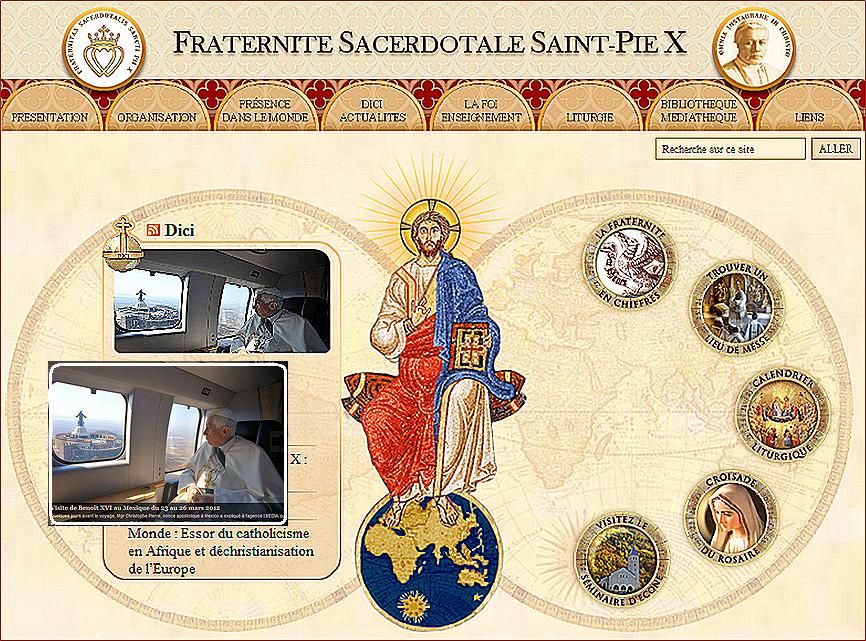 I took the liberty of reproducing the DICI photo as a slightly larger inset because it is presented as a teaser for the DICI report on the Pope's recent trip
I took the liberty of reproducing the DICI photo as a slightly larger inset because it is presented as a teaser for the DICI report on the Pope's recent trip
to Mexico and Cuba (it shows him looking out of the helicopter at the Cristo Rey monument in Guajanato on his way to the monumental Mass held at
the foot of Mount Cubilete, on which the statue was built). DICI reports regularly and objectively on the most significant developments in
the Catholic Church.
Earlier, Rorate caeli posted a translation from the German of a letter written by the superior of the FSSPX district in Germany in the May issue of the district magazine. The letter also seems to anticipate reconciliation with Rome, though carefully hedged in its statements. One must remember that public statements made by the FSSPX have at least three distinct audiences - the world outside the society, the society members themselves, and those who have provided financial support to the community all these years. So we may not expect less unequivocal statements until Pope Benedict XVI makes his decision. The editorial appears on pp. 2-3 of the 60-page magazine, and is untitled.
Editorial
by Fr. Franz Schmidberger
Superior of the Piusbruederschaft, German district
Translated from

May 2012
Dear friends and benefactors, dear faithful,
"We hold fast, with all our heart and with all our soul, to Catholic Rome, Guardian of the Catholic faith and of the traditions necessary to preserve this faith, to Eternal Rome, Mistress of wisdom and truth.
"We refuse, on the other hand, and have always refused to follow the Rome of neo-Modernist and neo-Protestant tendencies which were clearly evident in the Second Vatican Council and, after the Council, in all the reforms which issued from it.
In this statement of Abp. Lefebvre from his epochal declaration of 21 November 1974 are contained two inseparable fundamental principles:
On the one hand, the rejection of the spirit of the Council, of some of the declarations of the council and of some of the reforms that arose from the Council – and we have devoted ourselves with all our force to this task since the foundation of the Fraternity in 1970.
On the other, unbreakable relations with Rome, insofar as it portrays eternal Rome. We cannot expect, however, that after the conciliar and post-conciliar collapse, everything will be perfect again in the Church Militant in one day.
The Church has in her bosom both saints and sinners. Amongst her human imperfections can even be counted errors, even if they do not directly oppose the revealed truth. A Church Militant filled with saints only is the heresy of Jansenism, which has been condemned expressly by the Magisterium.
Of course every Christian has the duty to fight sin and error, each according to his possibility and his position in the Church; however, we must always start with ourselves and align our lives with the principles of the Catholic faith.
During and after the Council, the following slogan has been cited time and time again: Ecclesia semper reformanda est – the Church is always being reformed. This statement is ambiguous and was shamefully abused by those who want 'reform'.
It is only Catholic when we mean that the Church is always to be reformed in its members, the life of faith and morals must always be renewed, and even the discipline of the Church sometimes has to be adapted to new circumstances. But the structure of the Church is God-given and cannot be altered nor “renewed” by man.
Let us then not forget, in the heat of battle, the first principle of Abp. Lefebvre: the Church was founded by Christ on Peter. To him he entrusted the keys of heaven, to him he gave the mandate to feed the sheep (Mt. 16, 18ff; Jn 21, 15ff). [Why then did Mons. Lefebvre decide to defy John Paul II after he had already signed an agreement to be reconciled to Rome in 1988?]
And the field of the Church may be filled with weeds, so full that one can hardly see the wheat – but the Church has the promise of eternal life; the Lord is with her all the days until the end of times (Mt. 28, 20).
It is His Church, not ours. We do not have the right to dispose of her. We cannot see the Church in a too human, too political, or too diplomatic way. However much St. Athanasius, in the fourth century A.D., saved faith in the divinity of Christ, however much he safeguarded the survival of the Church – he was but a tool of Divine Providence, with which the promise of the Church’s perpetual existence was to be accomplished. Had he flinched from this mission, God would have called upon another tool.
And it is like this with Archbishop Lefebvre and the Society of Saint Pius X that he founded: the founder and his work have significantly contributed to upholding for the Church the true Holy Mass, the doubt-free sacraments, and the deposit of the faith during stormy times.
And yet, the great confessor-bishop, the priests that he ordained, the bishops that he consecrated, they are but unprofitable servants(Lk 17, 10), who are in the service of Divine Providence and promise. How much grace, greatness and joy lay in this being allowed to serve!
And yet, the tools do not possess the promise of eternal life, but the Church does, as the Mystical Body of the Lord. And this is why we hold fast, with all our heart, to eternal Rome, and why we want to be neither heretical, nor schismatic, but simply Catholic.
If Rome now calls us back from the exile to which it expelled us in 1975 with the abrogation of the [canonical] approval [of the Society], and even more in 1988 with the decree of excommunication, then that is an act of justice and without doubt also an act of authentic pastoral care by Pope Benedict XVI. And for that we are grateful.
With priestly benediction in the risen Lord and His most Holy Mother.
Father Franz Schmidberger
[Modificato da TERESA BENEDETTA 07/05/2012 02:58] |
| |
 06/05/2012 19:44 06/05/2012 19:44 |
|
| | | OFFLINE | | Post: 24.790
Post: 7.316 | Registrato il: 28/08/2005
Registrato il: 20/01/2009 | Administratore | Utente Master | |
|
 How Al-Qaeda would exploit
How Al-Qaeda would exploit
Catholic discontent to win converts to Islam:
Ireland would be fertile ground
By Michael Kelly

May 4, 2012
An American-born al-Qaeda official concluded that Catholics were “fertile ground” for conversion, “particularly after the rage expanding against the mother church [Vatican] as a result of its scandals and policies refused by many of its public”.
American al-Qaeda spokesman Adam Gadahn wrote to Osama bin Laden in January 2011 and laid out reasons for reaching out to Catholics, particularly the Irish. He urged bin Laden to use public anger at the Church’s mishandling of clerical abuse to encourage Irish people to convert to Islam, according to newly declassified documents.
The letter was contained in files allegedly found at bin Laden’s Pakistan hideout after he was killed by US special forces in Abbottabad, Pakistan, last May.
The Combating Terrorism Centre, a privately funded research base at the US Military Academy at West Point, posted a number of declassified documents belonging to bin Laden on its website yesterday. They were taken in the raid on his house.
The letter from Mr Gadahn particularly highlighted the reason for approaching the Irish, noting Ireland was not a participant in “Bush’s Crusade wars”.
It noted “the increasing anger in Ireland towards the Catholic Church after exposing a number of sex scandals and others” and speaks of the hunger of youths because of the economic downturn in Ireland.
Mr Gadahn wrote that Irish people, “who were the most religious of atheist Europe”, were moving toward secularism.
“Why do not we face them with Islam?” he asked.
He said he considered preparing a similar message to Catholics living in Arab regions, calling them to Islam: “Catholics were historically the prominent enemies of the Jews, among the other Christians. They were also the original enemies to the evangelist Protestants who were the vanguard of the Crusades. [Gadahn obviously has his history all wrong - Evangelist Protestants certainly did not antedate the Crusades!] Their public in general, these days, is more sympathetic and understanding of the Muslims, than other Protestant and Orthodox Christians,” he said.
However, he said he put off his message following backlash from an attack on a Catholic church in Iraq.
Fifty-eight people died in an attack on the Syrian Catholic Church in Baghdad on October 31, 2010, after military officials tried to end a terrorist siege of the church. [Modificato da TERESA BENEDETTA 07/05/2012 03:24] |
| |
 07/05/2012 00:21 07/05/2012 00:21 |
|
| | | OFFLINE | | Post: 24.791
Post: 7.317 | Registrato il: 28/08/2005
Registrato il: 20/01/2009 | Administratore | Utente Master | |
|

 President Napolitano's now traditional
President Napolitano's now traditional
annual concert offering for the Pope
takes place May 11 with Muti conducting

VATICAN CITY (AP) - Riccardo Muti will be conducting a concert in the Vatican in honor of Pope Benedict XVI.
He's the second big-name maestro to be conducting for the Pope this spring. La Scala opera house announced last week that Daniel Barenboim would conduct Beethoven's Ninth symphony when the Pope visits Milan on June 1.
According to a statement on his website Sunday, Muti will lead Rome's Teatro dell'Opera in selections from Vivaldi and Verdi in the May 11 concert, which is being offered to the Pope by Italy's President Giorgio Napolitano in honor of the seventh anniversary of his election to the pontificate.
[Since he became President, Napolitano has offered a concert as a tribute to the Holy Father every year at around this time. Last year, it was held on May 5, delayed by a few weeks in order not to distract from the preparation for John Paul II's beatification and the actual events. Conducting the Rome Opera House orchestra and chorus last year was Spanish maestro Jesus Lopez Cobos in a performance of Rossini's Stabat Mater and a setting of the Credo by Vivaldi.]
Benedict is a classical music aficionado and himself plays the piano.
It's not the first time Muti will conduct for a Pope: He conducted selections of Verdi in 1983 when Pope John Paul II became the first pontiff to attend a performance at La Scala.
Muti left La Scala in 2005 amid bitter controversy over artistic and programming differences and is currently music director of the Chicago Symphony Orchestra.
Muti wrote the Foreword to a book entitled Lodato Dio con arte [Praise God with art] (Venice, Marcianum Press, 2010, 254 pp) which puts together the writings and discourses of Joseph Ratzinger - before and after becoming Pope - dedicated to art, but particularly to music and song. The Preface was published in the OR in April 2010, and the following is the translation I posted at the time (on Page 96 of this thread):
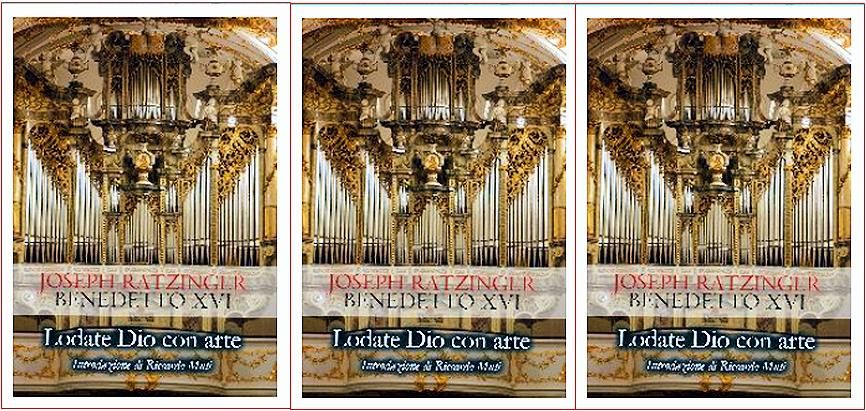 Music is a question of education
Music is a question of education
Preface to 'Lodate Dio con arte'
by RICCARDO MUTI
Translated from
the 4/29/10 issue of

Of course, it is not necessary to be Pope to frequent the world of music as Papa Ratzinger does who, at his venerable age and with all the tasks that his high position of Pastor for the entire Church must mean, does not disdain sitting down at the piano himself to nourish his spirit by playing his favorite composers.
But it is a great gift to mankind and for the Church at the start of the third millennium to have a Pope who claims a place and respect in the Church and in society for this high human expression.

He started to love music and to make music from childhood up to the time when, as he tells it, thanks to his brother, he felt that he was part of the family of the Domspatzen, the boys' choir of Regensburg, who perform at liturgical services in the city cathedral.
His early musical experience has marked his life, as it does the life of us who are professional musicians. The experience of music enriches human existence and opens it up to horizons that seem to be infinite and eternal.
"To sing is almost like flying," the Pope confided after a Domspatzen concert. "It is rising up to God, in some way anticipating the song of eternity". Whoever learns to sing as a child will sing all his life, and all life for him becomes a song.
The Pope is right when, on quite a few occasions, he has lamented the low level of consumer music, particularly the music and songs executed in churches these past few decades, especially here in Italy.
But the reason is inadequate musical education. Too little is given in the schools, and alternative or subsidiary activities that could include music are only for the fortunate few.
And in the parishes, at least in Italy, I think that the musical education of Christians is among the least of the parish's pastoral concerns, and perhaps even of the bishops.
(Teaching) music and singing in Italy has been left to private initiative. And only for those who have the predisposition and the talent, who also have the financial means to attend a private music school or are lucky enough to be employed in a conservatory.
In our country, one has to fend for oneself - even for music and song. And I have denounced this on so many occasions. In an evolved society, musical education cannot be treated this way. It means not having respect for the cultural value of music. Above all, it means not acknowledging or not respecting the anthropological value of music in the formation of persons who must live in society and communicate with others.
Choral and instrumental practice, like reading and writing, should accompany the entire time of basic schooling, from kindergarten to high school. Just as education in written and oral expression are part of a person's school itinerary from start to end, gradually enriched by the different cultural elements that provide the material for what to say or what to write, it is hard to understand why the same thing cannot be done for educating our children for musical expression through he voice and musical instruments.
If something could be done in this respect, then we could also reverse the tendency to consider music as an activity for a few elect, as simply one of the possible professional undertakings, a commodity to be sold, or nothing more than a leisure activity. It would surely follow that even in our churches, there will be more singing - and far better.
So it would not be too much to hope, even from these pages, for a musical education that not only will not emarginate anybody from music training and the pleasure of listening, but above all, promote in every schoolchild the development of self-perception, which reaches maximal expression and self-understanding in making music together.
It will never be too much to ask for musical education that not only teaches children to listen to music, to decipher its language and its messages, and make it into part of their baggage of cultural values; that not only teaches them to read music and to play at least one musical instrument, but above all, to sing and make music together, assimilating its rules and exigencies through practice, because this will train them for choral teamwork even in life.
I am truly grateful to the Pope for having brought back music to its right place - as he does through this book - within the Church and outside it, simply calling attention to it as an essential factor in the life of men.
His studies are illuminating especially in the field of sacred music. They clear the ground of equivocations and fundamentalist absolutisms pro and con, that have created confrontation rather than dialog and a common striving for the good of the Church and her liturgy.
They explain the uneasiness that so many experience when they go to Sunday Mass. But they also make us hope for a restoration of musical art that makes for good service to the liturgy and to the life of this world.
I share completely what His Holiness says:
"If the Church is to transform itself, improve and 'humanize' the world, how can this be done while renouncing beauty, which is one with love, and with it, is the true comfort, the closest possible to the world of the Resurrection?
"The Church should be ambitious - it should be a house of beauty, it should lead the battle for 'spiritualization', without which the world would become 'the first circle of Hell'.
"Therefore one must aim for what is appropriate to the liturgy and to the participation of the faithful, but we must do everything so that what is appropriate is also beautiful and worthy of the most important ecclesial action for which it is used" (P. 33).
"Rightly, a Church that makes only 'music for use' falls instead into the useless and itself becomes useless," the Pope says further.
The Church has and should carry out a much higher task: "It should be a place of 'glory', and also a place in which the lamentations of mankind are brought to the ear of God. She cannot content herself with what is merely ordinary and 'useful': she should raise the voice of the cosmos to glorify the Creator, reveal his magnificence to the cosmos, and make the cosmos itself glorious, and therefore, beautiful, habitable, and lovable."
Additionally: "Musical art is called, in a singular manner, to instill hope in the human spirit, which is so marked and often wounded by the earthly condition. There is a mysterious and profound kinship between music and hope, between song and eternal life: it is not without reason that Christian tradition depicts the blessed spirits in the act of singing chorally, rapt and ecstatic at the beauty of God. But authentic art, like prayer, does not alienate us from the reality of everyday; rather, it makes us able to 'irrigate' this day-to-day in order to make it sprout and bear fruits of goodness and peace" (p.124).
Undoubtedly, the cultural revolution that took place in the past century has placed into crisis the traditional codes of reference which conventionally served to establish what is beautiful and what is not in music.
The tonal system, chosen for centuries to represent the natural complicity between the world of sounds and man's consciousness, has been systematically abandoned, and new paths have been followed and will certainly be in the future.
Music, especially in the last decades of the past century, has become a phenomenon that is extremely varied and variable. There has been a renewal and an amplification of the musical language just as there have been theological, liturgical, cultural and existential innovations.
The idea and the claim of a single cultural and musical model has fallen off, and an infinite number have taken its place. Music has ceased to be an occupation of the Church or of the bourgeois salon, to serve the dominant religious or political idea.
Every idea has its own music, and every music claims its own space and recognition on par with so many other cultural expressions. To judge their value is not possible if one does not enter into the human and religious dynamic that inspires each kind of music and expresses it.
This varies from people to people, from group to group, often from person to person. This has produced a great variety of expressions and styles, whose objective is not the transgression of conventional or natural rules, but the composition of music that expresses what they want to say while being other than what our ears have been used to hear. One cannot form a value judgment without taking into account this plurality of styles.
There is no style that can boast of primacy over the others and to which the others must measure up in order to be legitimately useful in the liturgy. All styles have a right of citizenship in contemporary culture, and, I daresay, even in liturgy, at least if one considers that behind every style, there is not just the work of the musician, but also men, or even peoples, who in that particular way express themselves, their life and their faith.
It would not be proper to make a choice. That is to say, to select the men and the image of themselves and of God that they cultivate and wish to communicate.
Nonetheless, even in the complexity of the present time and its plural expressions - all legitimate - I dare to hope that the inspirational principles of authentic beauty evoked by the Pope will never be obscured or forgotten, principles upon which the musical patrimony of our culture and our history was created as an inestimable treasure, and which continues to speak in exemplary manner to the heart and the spirit of contemporary man, including the younger generations.
P.S. The publishers of Lodate Dio... ought to plan for a new edition every two years at the rate concerts are being offered to the Pope - three to four a year, which means that many musical 'mini-reviews' by Benedict XVI every year... Surely no Pope before him has written or spoken so much about art and music that a publisher could easily put together 240 pages of it in a book...
[Modificato da TERESA BENEDETTA 07/05/2012 03:22] |
| |
 07/05/2012 15:22 07/05/2012 15:22 |
|
| | | OFFLINE | | Post: 24.793
Post: 7.318 | Registrato il: 28/08/2005
Registrato il: 20/01/2009 | Administratore | Utente Master | |
|
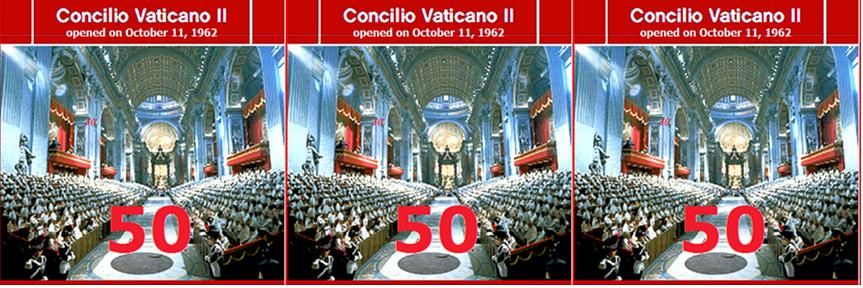 I had set aside this article for translation because it was rather long, and also because the information it contains is not subject to change any time soon. It is also rather technical about the subject of how to compile an archive, but it does shed much light on archiving problems for even such a fairly recent event as Vatican II, which took place before there were computers and even efficient copying machines... It is particularly relevant, of course, on the 50th anniversary of the opening of that historic Council... It was also disconcerting that the OR did not see it fit to inform the general reader about the names that Doria cites in the article and what they had to do with Vatican-II. I have inserted some brief biodata picked up from Wikipedia.
How much of Vatican-II
I had set aside this article for translation because it was rather long, and also because the information it contains is not subject to change any time soon. It is also rather technical about the subject of how to compile an archive, but it does shed much light on archiving problems for even such a fairly recent event as Vatican II, which took place before there were computers and even efficient copying machines... It is particularly relevant, of course, on the 50th anniversary of the opening of that historic Council... It was also disconcerting that the OR did not see it fit to inform the general reader about the names that Doria cites in the article and what they had to do with Vatican-II. I have inserted some brief biodata picked up from Wikipedia.
How much of Vatican-II
still remains to be studied!
Cataloguing still incomplete for
the Council archive ordered by Paul VI
by Piero Doria
From the 5/1/12 issue of
 The writer of the article is an assistant at the Vatican Secret Archives.
The writer of the article is an assistant at the Vatican Secret Archives.
On September 27, 1967, on orders of Paul VI, the Archive of the Second Vatican Council was 'born'. Mons. Giovanni Benelli*, then Deputy Secretary of State (Sostituto), communicated by letter to then Mons. Pericle Felici** that the Pope had approved the institution of "an office for the printing of the Council Actaa, and for the scientific compilation of all materials for the Archive".
* [Giovanni Benelli (1921-1982 was the private secretary to the future Paul VI in 1947-1050, before embarking on a distinguished career in the Vatican diplomatic service; he was named deputy Secretary of State by Paul VI in 1967, until he was named Archbishop of Florence in 1977, a position he occupied until his death.]
** [Pericle Felici (1911-1982) headed the General Secretariat of Vatican-II; he was made a a cardinal in 1977; in 1967, he headed the team that revised the Code of Canon Law, and later became Prefect of the Apostolic Segnatura.]
Primarily, the work would involve publication of the Acta Synodalia, which was completed only in 1999 under the special editorial supervision and competence of Mons. Vincenzo Carbone.
It was also Paul VI's intention that the new office would assume the task of gradually making the enormous mass of documentation available to scholars and researchers. Papa Montini was, in fact, aware, as he history of past Councils taught, that it was important from the beginning to avoid theological drifting or subjective interpretations of the documents in a way that would falsify both the spirit of the Council itself, as well as to faciliate a correct reading of the Conciliar documents by promoting direct study of the papers from the Council.
In this regard, one must recall the words of John XXIII, the Pope who convoked the Council, in his allocution Gaudet Mater Ecclesia (Mother Church rejoices) on October 11, 1962, which opened Vatican II.
Our duty is not only to protect this precious treasure - the depositum fidei (deposit of faith ) - as though were only preoccupied with the past, but to dedicate ourselves with prompt readiness and without fear to the work that our age requires... It is necessary that this sure and immutable doctrine be studied in depth and presented in a way that responds to the demands of our time.
"The deposit of faith - namely, the truths contained in our venerated doctrine - is one thing. How these truths are enunciated, while conserving their very sense and importance, is something else.
A place on via Pfeiffer was the first office for the Archive, which was classified in the Annuario Pontificio among the 'temporary institutions' of the Vatican. Its officials were Vincenzo Carbone, officer-in-charge; Mariano De Nicolò and Emilio Governatori, research assistants; Nazareno Cinti, writer-archivist; and Gianni Malpassi, writer.
In July 1975, the office transferred to the Palazzo delle Congregazioni on Piazza Pio XII (adjoining St. Peter's Square) in the rooms once occupied by the Congregation for Divine Worship, where it stayed until March 9, 2000, at that time reduced to one official, Mons. Carbone, who has now retired.
This writer (being in charge of preparing the Archive inventory) was present when Mons. Jorge Maria Mejia, Archivist-Librarian of the Holy Roman Church, and Fr. Sergio Pagano, Prefect of the Vatican Secret Archive, officially took over the Archive of the Second Vatican Council.
Transferring the documents to the Vatican Secret Archive took place in the next several days, under the supervision of the Prefect, with my participation and that of some staff members of the Vatican Secret Archive. At that time, the Council Archives had more than 2,000 unnumbered folder-envelops containing various documents.
At the end of the transference and a faithful reconstruction of the system used by the previous office, I started to study the massive amount of documentation to establish the criteria for a proper inventory and what form it should take.
It was immediately evident that it would not be possible to proceed to do this by sampling what was available, as is usual in these cases, in order to have an exact idea of all the papers found in the Archive. Although this was documentation from a relatively recent event, the complexity of its nature was also immediately obvious.
(As to the faithful reconstruction of the documents as previously 'classified' by the temporary office, I must point out that I personally undertook to numbering each folder-envelop before it was moved out.)
The complexity was also underscored by some memoranda from archivist Emilio Governatori, which is kept in the Council Archives, in which, in order to avoid "posthumous facile judgments and imputations" in the ante-preparatory and preparatory phases of Vatican-II, he had written: "For almost two years, all the documents regarding the answers of the bishops [to questionnaires sent out to all the bishops of the world in the months preceding the opening of the Council] which constituted the primary and largest nucleus of the Archive were used in the volumes Acta et documenta. In during this, the original documents themselves were handled since at the time there were no efficient photocopying machines. Often the order established by the researchers was disturbed several times whenever officials in charge of correcting the proofs took the necessary documents for reference without notifying the archivist".
Furthermore, "There was never a single proper responsible official for the Archive and its protocols... Many documents, among them the most important ones, were kept by the Secretary [Does he mean the General Secretary, Mons. Pericle?] in his own Archive.
It was only in 1962, shortly before the Council opened, that the Secretary was able to review the contents of his archive, and he passed on many documents to the general archive. Many documents were never properly subjected to [classification] protocol or were classified very belatedly... So it is possible that many documents are not found in the right chronological order, as to when they were received and when they were classified".
As for the rearrangement of the Archive, after the institution of the temporary office, Emilio Governatori wrote an 'attestation of (his) service' saying: "Reassigned to the Secretariat of the Post-Conciliar Commission and the Archive of Vatican-II on via Pfeiffer, Mons. Governatori edited the systematic presentation of all the documentary material from the ante-preparatory phase and almost all of the preparatory phase itself (under the Central Commission and Preparatory Commission of Vatican II). This work, which was suspended in 1962, after the Council had started, was carried on again in November 1967, when he [Governatori] returned to via Pfeiffer, until December 1968, when he was reassigned to the Pontifical Commission for Social Communications".
These testimonials, all of which can be counter-checked, as well as other factors - such as excessive use of photocopying; the use of original texts or original copies as drafts for publication; vote tallies at the Council classified according to the subject of the vote and then filed in separate folders; cover letters with attached votes, which sometimes were not signed or not properly 'numbered' according to protocol; the lack of some registration protocols - led the prefect of the Secret Archive to decide, on the one hand, to faithfully maintain the order established by the previous office, and on the other hand, to proceed to an 'analytical inventory'. knowing full well that such an inventory would doubtless require much more time and effort, but that it would be a most useful tool for researchers. as well as allowing the Secret Archive to dispose of a complete index of the most important documentation.
At the current state of the work, 1,465 folder-envelops out of a total 2,153 have been inventoried, for a total of 7,200 pages of inventory subdivided into 18 volumes, the 18th is still being completed but already has 408 complete pages and has to do with the documentation regarding the Secretariat for Christian Unity.
The inventory may be summarized as follows: Vol. 1 - General Congregations, envelopes 1-87; Vol 2 - Animadversiones scriptae (Observations in writing), env. 88-147; vol 3-5 Modi - env. 148-256; vol. 6-10 Segreteria Generale (General Secretariat) - env. 257-727; vol. 11-18 Commissions and Secreariats - env 728-1,465.
As for the original Vatican-II Archive - though the work carried out by Mons. Carbone and his co-workers was praiseworthy - I must say that sometimes one gets the impression no special attention was given to their office organization but that the work of publishing the volumes of the Acta Synodalia had completely absorbed all their efforts, especially after Emilio Governatori was assigned to another position in December 1968 (he had been archivist of the General Secretariat from November 1967). Governatori went on to become archivist of the Pontifical Commission for Social Communications without having finished the task of reorganizing the Vatican Council Archive.
In other words, the reorganization was 'interrupted' because it was no longer carried on with the same 'enthusiasm' by those who succeeded him.
Only such reasons could justify such an approximative ordering of the documentation, especially those that have to do with the General Secretariat [which 'managed' Vatican-II from its ante-preparatory and preparatory phases through its duration] For this section, in fact, the envelops were externally 'organized' in a confused way, without specific references, nor a chronological order, nor a thematic order, but most of all, without external numbering which may partly explain why they were returned to the shelves at random after they were consulted.
And, of course, all the anomalies committed can no longer be corrected, because the Council Archive had been much consulted before its transfer to the Secret Archive, and because upon their transfer, the envelops had to be numbered in order to facilitate any further consultation.
With regard to the work of the Vatican-II Commissions, insofar as their external ordering, and in some cases, even within the envelops, the papers are more carefully ordered, probably thanks to the fact that they were properly arranged before they were transferred from the individual commissions to the General Secretariat.
On the other hand, in the presentation of these considerations, it must be remembered that persons assigned to carry out the role of archivist do not always have the necessary competence and that some of them acquired this competence on the job.
In this regard, one example will suffice: the protocol for registry, whose criteria are generally well observed, at times became too 'personalized' leading to contradictory results, such as the protocol registries from the secretariat for Christian Unity.
It must also be pointed out that the few personnel of the Council Archive had to carry out truly exorbitant demands in terms of workload, often with great difficulty especially with respect to deadlines.
Another aspect that must be remarked is the dispersion of the documents, observable even during the Council, but which does not necessarily mean that documents have been misplaced. Unfortunately, especially on the part of the Commission secretaries, they would take their work home although these were official documents. In some cases, these documents have been lost, but some were fortunately recovered.
I will simply cite two cases. The first concerns the registry protocols of the theological commission and the commission for the doctrine on faith and morals. This valuable research tool has been missing.
In 2006, I pointed out this deficiency to the Prefect of the Secret Archive who wrote the undersecretary for the Congregation for the Doctrine of the Faith. But the CDF replied it did not have the documents. Likewise, the investigation carried out by the Jesuits at the Pontifical Gregorian University, where Fr. Sebaastian Tromp***
had resided, turned up nothing.
*** [Sebaastian Tromp, SJ (1889-1975) was a Dutch theologian who assisted Pius XII in preparing his theological encyclicals and John XXIII in preparing for Vatican II. He was secretary of the Doctrinal Commission for the Council under Cardinal Alfredo Ottaviani, then the head of the Holy Office (which was renamed to Congregation for the Doctrine of the Faith after Vatican II).]
The second example, fortunately positive, had to do with the documents from the preparatory commission De sacra liturgia
a liturgia" which, as Cardinal Felici wrote to Ferdinando Antonelli, OFM, on March 4, 1967, were with Mons. Anibale Bugnini. [One assumes Bugnini, the bugbear of liturgy, then turned them over to the Council Archive.]
Some recent excellent publications allow me, at this point, to introduce the topic of new methods of research. One must ask, in fact, whether, in order to reconstruct the Council dynamics, the documents published in Acta documenta and Acta Synodalis, as important as they are, continue to be sufficient - a question which can be asked as well of some very recent publications about Vatican-II, though one of them at least has dubious scientific value. Or whether deeper study of archival documents are necessary as a book by Mauro Velati and other scholars demonstrate.
Evidently, the answer, as far as I am concerned, is the second of the statements made above.
But I also wish to point out that the Archive of Vatican-II contains a whole series of letters and documents that have not been explored till now and which have a very great value to understand both the true spirit of the Council and the correct interpretation of the documents , exactly the way they were approved by the bishops of the world assembled in St. Peter's Basilica during four annual sessions and by Pope Paul VI.
I did not realize until after I had translated the above OR article that Sandro Magister had a commentary about it in www.chiesa
chiesa.espresso.repubblica.it/articolo/1350239?eng=y
which sounds more alarming than the way Doria describes it.
The point that a whole mass of primary documents relating to Vatican II have yet to be explored is not surprising, considering the at-best erratic efforts in the past to archive these documents properly, and that they are still being catalogued and will obviously not be available to researchers until this catalog is complete.
I also wonder why Magister does not say anything about the source material used by Dossetti, Alberigo and the so-called 'school of Bologna' in their much-cited multi-volume history of Vatican II [having been the only one available for decades!] since they obviously did not have access to the materials in the Archive.
I can well imagine Benedict XVI, upon reading this article, placing a call to Doria and his boss at the Vatican Secret Archive, to find out more about the status of the work on the Vatican II Archive - that is, if he was not already abreast of it before the article was written.
We can certainly expect a flood of articles and perhaps new information about Vatican II during this, the 50th anniversary of its opening. John XXIII announced he was calling Vatican II on January 25, 1959, and the Council itself did not begin until Oct. 11, 1962. That means that almost three years were spent preparing for it - this is what Doria refers to as the ante-preparatory and preparatory phases of the Council, when the Vatican consulted (in writing) bishops around the world on key issues and their primary interests, which helped the Roman Curia to draft proposals (called schemata) for presenting the issues to be discussed at the Council.

[Modificato da TERESA BENEDETTA 07/05/2012 17:21] |
| |
 07/05/2012 15:37 07/05/2012 15:37 |
|
| | | OFFLINE | | Post: 24.794
Post: 7.319 | Registrato il: 28/08/2005
Registrato il: 20/01/2009 | Administratore | Utente Master | |
|
 Pope delighted to hear of
Pope delighted to hear of
rising vocations in the USA
By David Kerr

Vatican City, May 6, 2012 (CNA/EWTN News) - Bishop James D. Conley of Denver said the news of rising seminarian numbers across the United States has delighted Pope Benedict XVI.
“He was very happy to receive that information,” Bishop Conley told CNA on May 4 after meeting the Pope at the Vatican.
“He said he had heard that vocations were going up in the United States and he said this is very positive news and, in fact, he had a big smile on his face when he heard the news.”
Bishop Conley was one of ten bishops from Colorado, Arizona, New Mexico and Wyoming who had an audience with Pope Benedict as part of their five-day “ad limina” pilgrimage to Rome which concludes tomorrow.
He explained to the Pope that there is now a year-on-year increase in the numbers of young men opting for the priesthood across many US dioceses.
“I told him that in the Archdiocese of Denver both of our seminaries, St John Vianney Theological Seminary and Rede,ptoris Mater Neo-catechumenal seminary, are full,” the bishop added.
“In fact we have more applicants than we have space so for the first time in many years we have to create a waiting list which is a good problem to have.”
The most recent statistics show a similar story across the United States. Last year the Center for Applied Research in the Apostolate at Georgetown University estimated that the 2011 seminary intake was up 4 percent on the previous year and had reached its highest figure in 20 years. Meanwhile, Rome’s North American College is full to its 250 capacity for the first time in decades.
Upon hearing that Bishop Conley was from Denver, Pope Benedict warmly recalled World Youth Day 1993 which was hosted by the Colorado city. At present the Archdiocese of Denver is vacant following the departure of Archbishop Charles J. Chaput to Philadelphia in September 2011.
Bishop Conley said he does not know when a successor will be appointed but he is certain that they will “carry on the great work of Archbishop Chaput in his 14 years and Cardinal Stafford before him,” describing their legacy as “a great flourishing of the faith” where “a lot of new movements, a lot of new evangelization” took place.
He believed that elsewhere could learn from “the Denver experience” as the universal Church approaches the Year of Faith later this year.
In particular, he thought people should take note of Archbishop Chaput’s ability to “teach the truth in all its clarity, even when challenging people against what the trends are in society, but yet doing it with love and compassion.”
This approach, said Bishop Conley, is particularly successful with young people who have a “genuine openness to truth.”
[Modificato da TERESA BENEDETTA 07/05/2012 15:38] |
| |
|
|
|
|